#people saying 'oh this character is a bad example' maybe that's the point.
Explore tagged Tumblr posts
Text
Well, I haven't read the origins comic yet, so I'll take your word for that. Some of the comic stuff is a bit wibbly on canon so I'm not sure if I do take it as campaign canon really, but I'll just go with it for the purposes of this conversation. (The fact that she never once mentions being run out of town by Yeza in the campaign makes that a little weird but sure ok. It also feels a little retconny to brush over her major fear that her family would reject her even if they DID know it was her under the curse, which was what was implied to be a big reason she stayed away in the campaign, in favor of it being because they DID chase her away based purely on what she looked like before she could say anything. It feels...strange. I'm not sure how I feel about it, I'll have to think about it. It just feels like after the fact justification of her staying away from them to me, but oh well. LET WOMEN BE FLAWED 2025! lol I am eventually going to get my hands on all of the origins comics, I just haven't done so yet.)
My point wasn't really a moral argument about Veth and Lilliana having done equally bad things in the world, obviously that's not true. I could have said It better, but I guess I just thought that was obvious and I was tired? lol, silly me. So to make it clearer: Veth is a hero who helped save the world, and Liliana fell in with a cult and did terrible things under the woefully misguided belief she was doing the right thing. I'm more saying I could see Veth turning out like Liliana if things went differently and their initial act of abandonment is fundamentally similar. Also, it's not just the hag thing btw, that was just the most obvious and memorable example I could reference and know everyone would know what I was talking about without writing a 5 page essay and hunting down obscure time stamps lol.
Another example was her stance in that discussion about justice and vengeance from ep 98 (26:26) with Caduceus. Cad basically said: Hey, going after criminals in the Empire sounds great if you can be smart about it, but if you're just doing it to make yourself feel better, I don't really see the point of that, so maybe don't because you'll probably restart the war if you aren't extremely careful. And Veth's response was very understandable from her characters pov, but makes me think that, yeah, in the right circumstances, she'll do what she wants, when she wants, and damn the consequences and it won't be about justice, it'll be about making herself feel good and she'll find the internal justification she needs to. "You can stand by -You can just watch bad people get away with it?" If the price of stopping one bad person is reigniting a WAR, um yeah, I can Veth. He's basically saying, don't cause more problems than you are going to fix by your actions, and interrogate your motivations and she wasn't having it. I think he might have gotten through to her in the end but I'm not sure because they "dissolved" using mouth sounds and hand waving into the next scene of Jester finding Marion.
There are many things that make me think this about her. Anger and desperation can cause people to make poor decisions. (I think you might have misconstrued the one bit where I was debating whether letting your family think you were dead and staying gone or just saying goodbye and abandoning them was actually worse or not, I personally vote dead being worse but I'm genuinely not sure, like I said. So, in that one aspect I think Veth's worse, but not for everything lol. The misguided hope left behind from what Liliana did might be worse.)
My point was that they both abandoned their families in order to solve a problem. Yes, Liliana left "voluntarily" right from the start in the sense that she wasn't kidnapped by goblins and transformed against her will, her "against her will change" was foisted upon her by a God Eater trapped in moon jail instead. She was essentially kidnapped by her own powers, she couldn't control them and needed to figure out what they were and how to deal with them. So yes, it was a choice for her to leave as you so aptly pointed out, just not quite as voluntary a choice as people keep presenting it as. I suppose it's more accurate for me to say it was Liliana's choice to leave, and Veth's choice to STAY gone (yes, even with the addition of the comic lore).
Don't you remember early campaign Imogen constantly having to be careful and worried about her telepathy? How it hurt her to be in large crowds? How her town DID treat her like garbage, like a pariah, "like an outright monster" even. It's not like Liliana left for fun. She was scared she was going to hurt someone if she didn't learn how to control herself, and worried that Imogen would develop those powers too. (That was her initial reasoning, and then things devolved of course). You said it yourself; The Grim Verity was taking too long, and she wanted to go home so she fell in with Ludinus and co because he promised answers and a solution.
Veth's initial separation from her family OBVIOUSLY wasn't her fault, and apparently in the comics she tried to go home and was run off for looking like a goblin. Well, that truly sucks for Comic Book Veth and she has my sympathy. There are still a variety of things she could have done, including once she befriended Caleb enough where she trusted him, have him go to Yeza in person and explain the curse and everything while she hid at the outskirts of town. She could have told Caleb a bunch of things only Veth would know to help convince Yeza, Etc.
At a certain point, Veth's Choice to stay away from her family was just as voluntary as Liliana's. She could have tried (or tried again if comics are canon) at any time, and she didn't. The problem wasn't solved so they "couldn't" go home and then events spiraled. Again, they aren't the same, I just think their situations parallel each other interestingly. Becoming "not a goblin" was not the only way for Veth to reunite with her family. It's perfectly understandable that she thought that it was considering all of her trauma and her shame and her fear, but that doesn't make it true. It was still an active choice that she made to not try to reunite with her family until she looked "normal" again, even once her circumstances had changed and she could have had help. She didn't try because she didn't want her family seeing her like that and because she was scared of what they would think. (Again, very understandable, but still a choice). What if Caleb couldn't find a way to change her back into a halfling? Would she never have gone home, continuing to look for a solution?
Liliana "couldn't" go home until she understood and could control her powers, a reasonable yet tragic decision, which then spiraled into it being that she "couldn't" go home until she helped "save" the world from the tyranny of the Gods, etc. Somewhat less reasonable I think you'll agree. How long does Veth's decision to not try (or not try again) to reunite with her family until she's no longer a goblin remain reasonable? One year? Five years? Ten years? It was a combination of luck and hard work that got her a new body as relatively fast as she did. Caleb and Essek meeting and becoming magic bffs might never have happened without Caleb's "I'm never going back to jail" moment in the Bright Queen's throne room for example lol.
More than all of that though, I'm not a huge fan of Veth's parenting while she IS present in Luc's life but seeing as Liliana hasn't really been present in Imogen's life for more than like a month, that's about where any parallels or comparisons stop lmfao. A lot of Veth's bad parenting once she's back in Luc's life is also due to the fact that Sam Riegel is a comedian first and an actor second so if he sees an opportunity to be funny, he'll pounce. Which unfortunately for poor Veth, does mean that if you look at her with a sober eye she comes across as a dreadful parent. Hilarious of course, but I did end up feeling bad for Yeza whenever I saw him futilely trying to be responsible whenever the M9 came trampling through their lives being bad influences. Honestly, she wonders why teenage Luc is like that! I learned it from watching you mom!
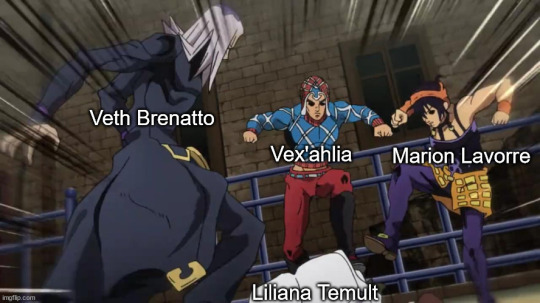
If the Good Moms of Critical Role ever learn about the shit Liliana's pulled it's on sight 😤
#critical role#the mighty nein#bells hells#critical role spoilers#veth brenatto#liliana temult#parallels#choices#yeza brenatto#luc brenatto#lol#veth is a hero#just wanted to make that clear#she's just also someone#I see going down a dark path#pretty easily if things were different
400 notes
·
View notes
Text
Cross-posting my meta/ranting from the Helluva Boss subreddit. Originally posted June 22, 2024 (here):
IMPORTANT DISCLAIMER: I love both Stolas and Blitzø. I'm super invested in this relationship. Both of them made mistakes, but both of them are also coming from places of trauma and previous fucked up interpersonal relationships. That being said, I don't really feel the need to point out how Blitzø fucked up, because so much of the fandom is so biased towards Stolas that everyone is already well aware of that part of the problem. I'm also very aware of the fact that Stolas has grown significantly as a character, but sometimes people in the audience forget the difference between what WE know, and what the CHARACTERS know. Now that that's out of the way...
Oh my god, THANK YOU. There was one particular line in Apology Tour that stuck out to me, especially because Blitzø's reaction wasn't what I hoped it would be.
Stolas: "I don't look down on you! How many times do I ha- when have I ever?!"
Oh, I don't know dude, maybe the entire first season?!
Episode 1: refers to Blitzø as "my little imp" during the phone call (using his bottom-of-the-hierarchy species as a cute pet name is..... bad. It's bad). Also just fully ignores the fact that Blitzø tells him that it's not a good time, that he doesn't understand what he's saying (more than once!) and clearly just agrees to the deal in order to deal with the more pressing issue of being shot at.
Episode 2: CONSTANTLY flirts with Blitzø using incredibly sexual language throughout the episode, even when Blitzø repeatedly tells him that he doesn't want to be flirted with while he's working. (That's not even going into how he completely ignores Octavia's emotions/reactions to what's going on around her and just focuses on himself and what he thinks is a good idea in the moment. That's two for two on episodes where his stunning lack of self-awareness shines through).
Isn't in episode 3 or 4. Though I will take a second to acknowledge one line in episode 3 - when Blitzø charges into the room and challenges Verosika and her crew, one of the succubi says "Is this little imp boy starting a demon duel?" Yet another example of imps being treated as lesser by other demons.
Episode 5: The constant heavy-handed flirting in public, again, even though Blitzø repeatedly tells him not to, again. On top of that, there's the "itty bitty imps like yourself" comment that he makes to Blitzø while in bed, and not even a minute later, tells him in cutesy UWU baby talk that he's "sowwy his cwients wiw have to wait" - not taking Blitzø or his work seriously. And, of course, we get Striker telling Blitzø that Stolas treats him like a plaything.....
Episode 6: ......aaaaaand the very next episode has Stolas literally calling Blitzø his "impish little plaything". Side note, but I feel like most discussions about Stolitz's dynamic and the imbalance present in it focuses on this line in particular, but not the rest of his behaviour throughout the whole first season. He is constantly making aggressively sexual comments, oftentimes right after being asked or told not to by Blitzø, sometimes after being told more than once.
Episode 7, he's actually fine. Hiding his face when Ozzie singles him out isn't great, but he had just been publicly embarrassed, and if you watch in the background, he does get up from the table (likely about to try to help Blitzø) right at the end of Verosika's bit, before he's interrupted by Asmodeus. And while I'm certain he really did just want to "talk, or watch a movie, or cuddle", I can also see how easy it would be for Blitzø to interpret that as him asking to Netflix and Chill, as it were.
(Also, not a major thing, but having a little plush imp doll as a kid (as seen in S2E1) feels.....really weird, to me? Like I know most posts on SocMed and reactions on YT just see it as cute, and I'm probably reading too much into it, and I know that IRL toy dolls and stuffed dolls of people are a common thing, but just the idea of a prince having a plush doll of a low-class citizen feels really bad. A literal plaything, if you will.)
Season 2, Episode 2: Not much, but even though they had a tiny bit of a fight (if you can even call it that) after Ozzie's, and even though they haven't been communicating super well, and even though he's concerned about finding Octavia, Stolas still finds an opportunity to make a sexual comment towards Blitzø.
Season 2, Episode 4: Ohhhhhhhhhh my god, I never even used to be mad about this, but the way that it got brought up in Apology Tour made me pissed. Stolas now getting upset about Blitzø not coming to rescue him when Striker kidnapped him? Telling him that he "couldn't even be bothered to come help me"? Fuck. Off. With. That. As a father of a daughter himself, you'd think that Stolas would be sympathetic to the fact that Blitzø was trying to help out his own daughter in that scene, especially considering that he had to wait 5 fucking years for a mandatory medical procedure. Of fucking course he's not going to skip out on that! And just the way he responds to that:
Stolas: Oh, ha, ha. Well, I do agree that is very important...But, I-
(and then he's cut off by Striker). I urge anyone and everyone to go rewatch that bit of the episode, because his tone of voice is just so dismissive. Like, "yes, yes, that's nice, now drop everything and come rescue me, which is more important". And that's before he even realizes that he's in serious danger!!!
Like, I'm sorry, but where the fuck does he get off getting mad at Blitzø for "always making it about sex"? Blitzø has only ever reacted to the sexual advances that Stolas was putting out - even from the very first hook-up, Stolas just assumed that Blitzø was there to seduce him, and Blitzø just went along with it as a way to distract him while he stole the book. He agreed to the transactional fucking in episode 1 while he was being shot at and was trying to get Stolas off his back. He's expressed annoyance towards Stolas' sexual advances in episodes 2 and 5 of season 1. And now suddenly it's Blitzø that makes it all about sex?!
And what do you mean, "How many times do I ha-" Have to what, buddy? Tell him that you see him as an equal? You haven't done that yet. Tell him that you love him? You did that whole conversation in pretty much the exact wrong order and shut down when he didn't react like you imagined in your head. Tell him that you think highly of him? You haven't done that. Not directly to him, not where he could hear, not before the end of that argument, right before forcibly teleporting him away from you, which, y'know, just reinforces Blitzø's earlier comment about treating him like one of his butlers, and how he "can't just dismiss [him]."
He may not have ever actively viewed Blitzø as inferior to him, but there's a LOT of internalized classism going on that I'm not sure he's even aware of.
(continued in a later comment):
One thing I'd like to add to all of 👆 that: I mentioned a bit about other people in Hell talking down to imps, but one thing I forgot to talk about is how Stolas himself views imps that aren't Blitzø. Quick list (entirely from memory):
Refers to Millie and Moxxie as "you littler ones" in Loo-Loo Land
Refers to I.M.P. collectively as "you little creatures" in Truth Seekers
The generally condescending and dismissive way he talks to the imps of the Wrath Ring in Harvest Moon Festival - if I'm remembering correctly, he also refers to them as little! Like I get it, he's crazy tall, but we all know that's not the only way to interpret that comment.
3.5 Since Stolas (and a big chunk of the fandom) went ahead and compared Blitzø's comments to Striker's, I'm gonna do the same to him! Those comments are so reminiscent of Striker saying "you little things ain't worth the clean-up" to Moxxie and Millie, also from Harvest Moon Festival.
4. Picking up, forcefully squeezing, and swinging around his imp butler while he was mad during his phone call with Stella in Seeing Stars. I'm not saying that he's abusive towards his staff, or anything like that - just that the very fact that he did it at all seemed to be totally subconscious, which in turn suggests that he doesn't realize how demeaning that is.
5. Actually, now that I think about it - the fact that he's so upset that specifically Blitzø didn't rescue him in Western Energy. The main reason he's alive and not bleeding out in the bottom of a mine shaft is because Millie and Moxxie showed up, and they only knew to go there and help him because Blitzø told them/they were there during the phone call. Like, does he even know their names? Is he even grateful that they helped? We don't know!
I saw someone in another thread say that he was essentially at the equivalent of the "I'm not racist, I don't even see colour!" stage of racism, and I completely agree. He doesn't realize all of these internalized prejudices he has, but they are ABSOLUTELY there.
(comment on another thread, building off of the comments I made about s2e4, originally posted July 7, 2024):
Also, a few other points to build off of this & respond to other comments on this thread:
"But he didn't tell Stolas about the first time, and the Carmine-crafted gun that Striker had that can kill royal demons" - You mean the one that Moxxie took from him and still has in his possession at the end of Harvest Moon Festival? The one that Moxxie was shocked that Striker even managed to get his hands on? Remember, I.M.P. didn't know that Striker was working for anyone; logically, that means they would have assumed that he got the weapon entirely on his own, and something like that is both rare and expensive - imps don't typically "make it big" in Hell, and I can't imagine a powerful Overlord would be thrilled to give a weapon that could kill them to someone so far below them in status. With them taking it from him and keeping it at the end of the episode, it means that they would assume that he's no longer a serious threat. They had no way of knowing he was being bankrolled by a royal, with access to three more angelic weapons (two pistols and a knife) (four if you count the rope as well).
"Stolas: You knew someone was trying to assassinate me?" Uhhhhh, yeah? You were there for Loo-Loo Land, dude, you know that people are trying to assassinate you, like all the time. This isn't news in any way - and yes, Striker is generally more dangerous than any of the assassins that we saw in that episode, it still doesn't change the fact that you're already well aware that being rich and royal puts a target on your back. This is really unfair to get upset with Blitzø for. (I'm aware that this is an argument and sometimes you bring up unfair accusations in arguments and both of them were very heated and I shouldn't have to plaster every comment about this episode and this relationship with disclaimers that I'm not hating anyone, just expressing frustration.)
#sorry for the long post i am incapable of being succinct#kat chats#helluva boss#meta#stolas#stolitz#blitzø#moxxie#millie#since i do bring them up at least a little bit#i actually have another post i want to make about re: M&M and my comments about s2e4 but i'll do that later#also reiterating my disclaimer that i love all of these characters - stolas is just currently at a very specifically frustrating point#in his character arc/growth
20 notes
·
View notes
Note
1, 2, 3, 7, 8, 18, 19 and 20 for Kokichi for the character ask??? (Sorry if that's too many haha)
Woah, so many! Okay, okay, I don't mind👀
1. Why do you like or dislike this character?
I love him so much!! I really love how complex he is, how incredible charismatic and fun he is, how fucking smart he is... And I also love how flawed and biased he is. And how cynical and stubborn he is.
I absolutely LOVE the characters that are right and wrong at the same time. Kokichi often says something that is technically right, but at the same time his judgement is very flawed so it's impossible to completely agree with him. Or he's trying to do something good but the way he's doing it is... not great. Or has a good intentions but is being a complete asshole about it.
Like, for example, the situation with Maki. Yes, it's a good thing that he warned everyone about an assassin since they're in a killing game. But also he was trying to separate her from the group and kept needling her even when she wasn't showing any agression to others (and also she had plenty oportunities to kill, but made no move to do it). Only willing to see her as a threat.
And, of course, he's also a very tragic character. What's even worse is that most of it is self inflicted. He isolates, he turns people against himself, he cuts off every possible friendly connection he had. He spends so much time investigating, coming up with plans. And dies in a horrible painful way for the sake of a plan. The plan that didn't work. And he lied to such an extent that people doubted even the sincerity of his last words. Absolutely soul crushing (and body crushing SORRY)
10/10 angst, my heart is in pieces💔
He's both funny and entertaining and also very tragic and I love him for it
2. Favorite canon thing about this character?
Hmm... Hard to only choose one
Probably his insane acting abilities. How much he's able to control his emotions, how fast can he switch from one to another. How he's able to keep his face no matter how he feels
3. Least favorite canon thing about this character?
Difficult question, because I really like him. Even (especially) with his flaws
Uhhh... His bad CGs maybe? It's more of a problem with V3 in general (although some CGs from other games also have problems). But I'm just thinking about those ones from after trial 4 and they... look very weird. It might be becuase V3's production was rushed, but still
Other that that it's what I'm talking about in 19th question
7. What's something the fandom does when it comes to this character that you like?
8. What's something the fandom does when it comes to this character that you despise?
I'm gonna answer these two questions in a different ask since it would probably be pretty long answer and this post is already long enough
18. How about a relationship they have in canon with another character that you admire?
Oh, I'll take this as an invitation to ramble about Kokichi and Kaito!! >:]
I think Kaito and Kokichi's relationship is probably the most interesting in the game. They are polar opposites. They are two sides of the same coin. The are narrative foils.
It's so facinating to see their opposite ideologies clash. Kaito is an idealistic optimist, who wants to play the role of a hero, who values emotions over logic, who's willing to believe at someone simply because he wants to. Kokichi is a cynical pessimist, who likes playing the villain, who values logic over emotion, and who would rather lie, than let people get close to him.
Because of that they constantly get into arguements. And they're totally baffled by each other. Before they never met anyone like that, probably haven't even considered people like this real. How could someone be so cynical and distrusting? How could someone be so naive and trusting? They just can't understand each other's point of view because it's so different from their own. And that's just so fun to watch
But at the same time... They are very similar. Both of them are liars. Both of them are upholding an image, presenting themselves stronger than they are. Both are social, like to be around people. Both like to have fun. Both like to tell crazy stories. Both sometimes act "immature".
And also I like this little fact that a lot of Kaito's loved items are Kokichi's liked items and a lot of Kokichi's loved items are Kaito's liked items. So they even have a lot of shared interests!
It's very entertaining to watch them get into conflicts with each other. And it's because of all their antagonism throughout the game, that it's so cool to see them work together in Ch.5.
They're forced in a fucked up hopeless situation and they do their best to make the most use of it. They have a common goal: to end the killing game. So they put aside their differences and work together. They see each other in their most vulnerable moments. They hate it, but there's no way to avoid it. They put their trust in eachother. They switch roles. But at the same time the roles don't change. Kaito becomes a liar (but he was always one). Kokichi becomes a martyr (but he was always going to do that).
I love 5th case because it's not a murder out of malice, not a murder to get our and not an accident. It's an act of trust. They both put trust in each other. Even though they were pretty much enemies for a good part of the game! They both know they're dying. They both know that there's a high risk of the plan failing. But they still choose to do it. For a small chance of success. For a small chance of a happy ending. Not for themselves, but for their friends.
In my opinion Kaito and Kokichi have one of the most interesting relationships in DR. And I firmly believe that to understand one of them, you have to understand the other. Only then it's possible to see the full picture.
19. How about a relationship they have in canon that you don't like?
Kokichi's relationship with Kiibo. He's just constantly picking on him for no reason. The bit quickly becomes too repetetive and just unnecessary mean. Also to me it feels that a lot of things Kokichi does should have some kind of meaning behind them (sometimes even several layers of meaning). So I would've kinda expected that since Kokichi's doing this so persistently, he's trying to do something. Like maybe he's somehow trying to push Kiibo to accept his unique abilities and powers. And while that maaaybe kinda can be interpreted like Kokichi is doing it in the most weird awkward way possible. But still, it's a pretty big stretch. Without any actual payoff it's just Kokichi being mean to Kiibo and that's it. Just bullying the poor robot who wants to be treated normally
They could be friends if Kokichi was nicer to Kiibo. And I would really like them to be friends...
20. Which other character is the ideal best friend for this character, the amount of screentime they share doesn't matter?
GONTA!!!
Kokichi's friendship with Gonta is so so important to me!!
I don't know, I just think it would be so nice if Kokichi would hang out with Gonta and listen to him talk about bugs even though he hates bugs. And if Gonta would participate in Kokichi's pranks. I just like to think they would have fun together. They could've been such an cool duo if they weren't in a shitty stressful situation.
I like Kokichi being friends with Miu and potentially with Rantaro and with Kaito, but Kokichi's friendship with Gonta holds a special place in my heart<3
Thank you for the ask!!<333
15 notes
·
View notes
Text
sometimes media serves as an example of what NOT to do. now i say this thinking about a streamer committing too much time to an impossible task when he has more important things to do but genuinely this goes for a lot of media and people need to remember that
#people saying 'oh this character is a bad example' maybe that's the point.#a lot of the time a creator will write with the intention of saying 'hey see this? don't do this.' but you cant expect them to just SAY tha#a good writer's not gonna take the consumer aside and say that Thing Bad. it circles back to showing not telling#if the character doing Bad Thing ends up facing consequences for their actions it's safe to say that the author thinks Thing Bad!#i have ocs who smoke but i would never smoke myself nor encourage others to. eventually these ocs quit smoking late in the narrative#but one of them has to realize how his smoking negatively affects his relationships before he makes the decision to quit#for a majority of the story he happily smokes and sees nothing wrong with it nor does the rest of the main cast say much abt it#a lot of the ocs in this story are bad examples one way or another. in fact one is an abuser but he eventually gets what he deserves#a person could create bigoted characters that may not even be antagonists but that does not mean they themself are bigoted#it's important to look at the writing surrounding a character before claiming the creator is glorifying or supports the character's actions#but apparently some people just dont do that i guess! like idk ive heard things#if i were to write a story about queerness it would NOT be happy feel-good everyone is supportive rainbow utopia. there WOULD be queerphobe#simply because i want to reflect my experience. would the queerphobes change? probably not! doesnt mean i agree with them#whoopsie i went on a tangent. didnt even mean to haha
5 notes
·
View notes
Text
i feel like im not making any sense but does anyone else feel like there are stories that let u run with them and ones that spell everything out for you
#im reading that post that says artists are directors of audience reaction and not its dictator:#'you cannot guarantee that everyone viewing your work will react as you are trying t make them react. a good artist knows that this is what#allows work to breath. by definition you cannot have art where the viewer brings nothing to the table ... this is why you have to let go of#the urge to plainly state in text exactly how you think the work should be interpreted ... its better to be misinterpreted sometimes than#to talk down to your audience. you wont even gain any control that way; people will still develop their opinions no matter what you do#im thinking abt this again cuz i was thinking maybe the thing that lets adventure time work so well the way it does is cuz it doesnt#take itself too seriously that it gives the audience enough room to fuck with subtext and then fuck with them back yknow. i think it was#mentioned somewhere that they werent even planning to run with the postapocalyptic elements that are hinted in the show but changed their#mind after the one off with the frozen businessmen and dominoed into marcy and simons backstory. on the other side there are stories that#explain too much to let the story speak for itself and i think it ends up having to do more with the crew trying to lead ppl in a certain#direction than expand on what they have and i see a lot of this with miraculous. like when interviews and tweets are used as word of god in#arguments and it becomes a little stifling to play around with it knowing the creator can just interject. u can say its the crews effort to#engage with its audience but it feels more like micromanaging. and none of this is to say there ISNT room for stories that spell things out#theyre just suited for different things. if sesame street tried abstract approaches to themes and nuance itd be counterproductive#a lot of things fly over my head so i need help picking things apart to get it- but it doesnt have to be from the story itself. ive picked#picked up or built on my own interpretations listening to other ppl share their thoughts which creates conversation around the same thing#sometimes stories will spell things out for you without being so obvious abt it that it feels like its woven into the text. my fav example#for this might be ATLA using younger characters as its main cast but instead of feeling like its dumbed down for kids to understand why war#is bad its framed from a childs point of view so younger audiences can pick up on it by relating to the characters. maybe an 8 year old#wont get how geopolitics works but at least they get 'hey the world is a little more complicated than everyone vs. fire nation'. same for#steven universe bc its like theyre trying to describe and put feelings into words that kids might not have so they have smth to start with#especially with the metaphors around relationships bc even if it looks unfamiliar as a kid now maybe the hope is for it to be smth you can#look back to. thats why it feels like these shows grew up with me.. instead of saving difficult topics for 'when im ready for it'#as if its preparing me for high school it gave me smth to turn in my hands and revisit again and again as i grow. stories that never#treated u as dumb all along. just someone who could learn and come back to it as many times as u need to. i loved SU for the longest time#but i felt guilty for enjoying it hearing the way ppl bash it. bc i was a kid and thought other ppl understood it better than me and made#feel bad for leaning into the message of paying forward kindness and not questioning why steven didnt punish the diamonds or hold them#accountable. but im rewatching it now and going oh. i still love this show and what it was trying to teach me#yapping#diary
101 notes
·
View notes
Text
Rare But Not So Rare Sonic Moments
Sonic Swooning Over Amy
So, Sonic’s been kind of the driving force of Sonamy recently. Let’s analyze that.
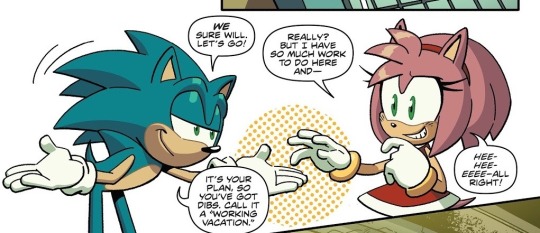
I’ll show Sonic having feelings for Amy in almost every media aside from Fleetway and the two cartoons she isn’t in. I’ll also present the “whys” in more detail then just “Amy calmed down.” While that’s part of it, I’d like to add my own can of worms. And possible headcanons too. Bear in mind I never grew up with Sonic, so forgive my mixed opinions.
While I love Amy having a crush on Sonic like the energetic sugarplum she is, nowadays Sonic’s oddly been the drive of their dynamic. Any examples of it beforehand? Let’s look outside of the games first.
Sonic X
This Sonic takes more time to himself. He’s introverted, so his feelings for her isn’t displayed as obviously as the others. In fact, most people think he didn’t like her in this show because of how much he runs away. He even manipulated her by flirting in one episode. In my opinion this show has Sonic running away from Amy more often than not. Hot take: Sonic and Amy never had a real conversation either. They don’t…talk like they do now. Unless you count,
“Oh, Sonic I love you!” “Ah! C’mon, Amy. Knock it off!” No, it wasn’t constant but still common.

From my point of view, the conversations were short lived to none existent. It was the same in the earlier games too. Compared to how they talked to other characters or now, you might be able to notice. At least until Sonic And The Black Night were he talks to both The Lady Of The Lake and Amy. The two would also have visual gags of Sonic getting aggressively hugged by Amy. Or Amy falling on her face while trying. Aside from one moment in Sonic Riders where Sonic put Amy in danger, it wasn’t good or bad. Just cartoony for lack of a better term.
Maybe I’m just insane. You decided.
Anyhow, their dynamic in X is clearly built on actions. Like Amy giving Sonic a seashell bracelet and Sonic giving her a rose. Those little things. While I do prefer them being able to hold longer conversations, I don’t mind how X handles them. But let’s get to Sonic’s crush. I assume in Sonic X Sonic is conflicted. He’ll run away from Amy or try to pull from her on most occasions and others Sonic would constantly hold onto her when he doesn’t have to. For a long period on time no less. Amy’s the same way. One moment she’d be head over heels and other she’s bashful. Goes to show how young they were I guess. I have no clue as to why Sonic liked her back because there wasn’t much to go off of. Except the bracelet moment or her general kindness like feeding him one time. She was a bit much to him and most characters back then.
It’s possible Sonic just liked her and that was it, but I’d imagine due to all of the hand holding and small reciprocated gestures were enough to convey something was there. Straight forward and simple like the show itself. I headcanon this Sonamy being where the boyfriend gets dragged into a relationship and is fine with it. This version of Sonic’s attraction seems to be chaotic pink hedgehogs apparently.
Sonic Boom
Should I even explain it? Might as well because not only do I have something different to say, but these two haven’t been brought up much. Sonic and Amy’s romance mostly is played for laughs. Not saying their love for each other means less because of that, but the humor is the main reason they exist. Much like why in the main canon they started out the way they did. Regardless, I’ll dive deeper into Boom!Sonic’s affection for Amy to the best of my ability.

Boom!Sonic is egotistical, so whenever he thinks Amy’s crushing on someone else, it bothers him. Apparently he’s the only one she’s allowed to like. No “Radical Speedsters” or “Celebrities” can take her attention away from him. Like in Sonic X he tries to keep his crush to a minimum. Even though both him and Amy are terrible at it.
The moment in “Fortress Of Squalitude” a episode where everyone is a bit rude to Amy, close to the end Sonic says, “We may have a hard time saying it Amy. But…well you know.” Then she responds with, “Yeah, I know.” It’s such a sweet moment. Not as powerful as most moments with them but for Boom it’s very nice. Sonic and the others still value her as part of the team, but it’s Sonic who expresses it out loud. Goes to show how much he cares about her for even attempting to open up in this instance. Didn’t even have to finish the sentence. Amy understood perfectly. I also noticed how much he tries his best to impress her. When he needs to return her book back, finds her hammer in Archie, (Vector did it in the show and Sonic got jealous) shows off randomly or dreams about her, and stopped racing to get her some eggs in one episode.
The funny thing about this Sonic is how much of a people pleaser he can be. Especially since the towns people are very spoiled and ungrateful. He wants to be needed and that’s possibly why he goes out of his way to do special things for Amy like go out on picnics, implied dates, and comforts her. She’s very take charge in Boom and Sonic has no problem calling her out when he needs to. Much like Amy in the show and games. Sonic will even put effort into doing things he doesn’t feel like doing for her. How honorable of him. Sure, sometimes he tries to make her jealous and isn’t perfect, but he tries. I believe Sonic likes Amy because again like Sonic X Boom isn’t canon, so more outright reciprocated feelings are allowed in this case. Not to mention the dude likes being shipped with her in the show. Which is a win in my book.
Sonic enjoys bugging Amy much like a playful boyfriend. He probably admires her leadership, but I’m saying this by observation. It could be for anything. Maybe he thinks she’s cute when she’s mad and finds her temper amusing. It could also be for her stubbornness. Some people like each other because of how much they can relate to their partner and in Sonic Boom’s case they’re two cuts of the same cloth. Although still different, due to the show’s theme, they carry the same condescending, slightly self centered, hotheaded, stubborn, and humorous traits. But they’re still good hedgehogs with a heart of gold and usually makes reasonable decisions. Not to mention they’re both equally shy about their crushes. In Sonic Boom, Sonic and Amy is that married couple who doesn’t get along much, but when they do you’ll understand why they stay together.
Reboot Archie Sonic
I haven’t read the comics (unless you count watching a few dubs and internet reviews) but I’ll give my limited thoughts. Luckily there’s not much to say. Although most people believe it was unintentional, I don’t think it’s too much of a stretch that someone from Archie thought it was a fun idea to have Sonic crush on somone in this reboot. Maybe it’s unintentional but it doesn’t seem that way.

I’m basically using this part of the post to ramble about how Reboot Archie’s Sonic still manages to be a casanova. He’s like a mixture of his old self and how he is in the games. That’s also why he acts the way he does around Amy. Could it also possibly mean he’s meant to like her canonically too? Reboot Archie did have to follow a more accurate way of writing Sonic after all. Anyways, let’s run down the list of Game!Sonic if he was allowed to be down bad for Amy like they’re already dating. Which is how I view this continuity. It’s basically if Boom and X had a weird fusion and this version of Sonic’s crush was the result. Except here he manages to be more bold and upfront. He knows what he’s doing. Here’s a run down.
First of all, THIS. No joke, more of these interactions would send me to the moon. I would explain why but the panel speaks for itself.
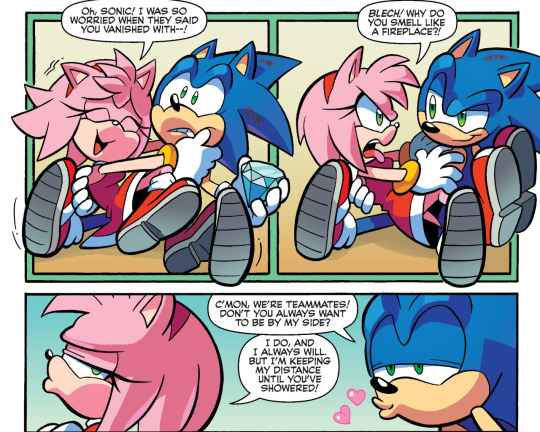
Sonic says, “I was worried about you.” Which he hasn’t admitted to her before this to my knowledge. He states this by giving her a side hug. Along with other out of nowhere physical affection and flirting. Not to single out Sonally fans. Sonic and Sally clearly have a close connection people appreciate and I respect that. In any case, Sonic and Amy in Reboot Archie also matches energies so much. They’re both clearly running off the same brain cell. You’d think they were together. They’d be a chaotic couple that’ll do the most outlandish things and somehow manage to survive them. After willfully risking their lives they’d do it again because being normal and safe is boring. I promise you, this version of Sonamy would be a huge force to be reckoned with.
-I’d also like to mention my friend Salty showed an example of Sonic being jealous of Knuckles coming with Amy on a mission and it’s brilliant. Dude gets all bratty about it too. Archie!Sonic does not play around. The post in question.
Sonic Prime
Already talked about this in another post, but I want to mention it again. Prime!Sonic is the most sensitive version of the character, so it’s no surprise he displays his admiration for Amy freely and out loud.
This moment says enough on its own. Sonic’s like this throughout the entirety of Prime and even changes the tone of his voice when speaking to or about her. It’s so authentic and adorable and makes him stand out against other variants.
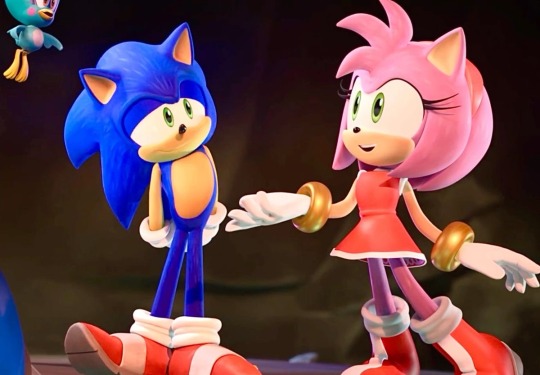
Amy’s crush on Sonic in Prime is up to interpretation, but I don’t think she likes him in that way personally. Like other characters, Amy tends to be done with Sonic’s childishness. Guess she thinks he’s probably too immature to be boyfriend material whether she has feelings or not. Sonic on the other hand, acts how you wouldn’t expect. I personally see him as his own interpretation, so I’m fine with it. If he wants to have goo-goo eyes for Amy in Prime, it’s cool.
Prime!Sonic has it bad and I wouldn’t be shocked if he’d be the one wanting to go out on dates. Maybe he’d cook dinner for her sense he cooks in the show. I’d imagine Amy declining at first, but does it after his constant begging. They’d be swapped version of most emotional to least emotional. Prime!Amy would be a girlfriend who feels more like a parent than a partner.
Unleashed/Black Night
No one can bring up Sonic Unleashed without the lovely Amy meeting the Werehog scene. I love how Sonic didn’t like Amy hugging him, but right after she left he solemnly mopes around for probably the first and last time. He’s never in any game slowly moped around disappointedly before. Proving he only has certain reactions when it comes to Amy Rose. At least in some continuities. Unleashed gives you a choice to go on a date with Amy or not. Then the next game Sonic Team followed through with it, but ended up having Amy mad at Sonic for missing it. At least Sonic tried. Not to mention his reaction to The Lady Of The Lake and him flirting is fun to watch.

See how Sonic still likes her back but it isn’t because she’s “calmed down?” She’s still the same excitable love strucked Amy. There must be something more to it. Other than the obvious answer with Sonic Team wanting to do something with the pear. I have no idea why but having multiple hints even in the past must’ve been done for the fun of it. “We created this love interest but then railed back to Sonic not reciprocating her feeling. But we still want to market them as a couple in some way.” This franchise never cease to confuse me.
Amy encouraging Sonic in one of the cutscenes could’ve been where he started liking her back. Not in the way he does now, but he admired her none stop compassion and might’ve wanted to return the favor. “Eh, she’s sweet. Maybe a date won’t be so bad.” The fact he went out of his way to get her a chilidog and flirted with a different version of her should tell you enough. Of course it would take a while before anything else happened. 
IDW/Sonic Frontiers
Yeah, after issue 2, Sonic’s never felt the need to run from Amy. From the comics to Sonic Frontiers there’s a lot of moments of Sonic being somewhat emotionally candid. Not by much, but close. I believe Amy’s the reason for that in a way. Sonic’s not afraid to hang out with her anymore. He even hugs her back on some occasions. “Ames” was a nickname from fanfics and Boom which became canon over time and he occasionally calls her that.

Sonic wishes to share an umbrella and spend more time with her. He also gets excited to see her more often. It’s like Reboot Archie but slightly toned down. At least up until the hard to trigger lines from Sonic Frontiers. The same game where he outright admits to being worried about Amy and smiles back at her with a Coco looking between the two. Then he supports Amy’s decision to leave etc. We all know where we are now.
Crazy how the more you look into this franchise the more tiny details you notice. It’s also crazy how much Sonic’s been into the love interest he originally was already supposed to love. To me, Sonic had a crush on Amy in Unleashed but fell in love with her in IDW. What makes Sonamy gripping though is how unique it is compared to most romantic relationships. Leaves it to be more entertaining whenever something unexpected happenes. It keeps you engaged.
Why Sonic Crushes On Amy?
1. Amy doesn’t want to slow him down. Obviously because of IDW issue 2’s love confession with Amy saying “I can’t change you. I don’t want to change you.” Amy joins Sonic and he includes her more often because of that. His speed is no match for her persistence anyways.
2. She shows compassion and love for those around her. Not just to Sonic, but everyone. She’s the definition of soft hearted. Even for people Sonic and his friends would be weary about. Think about now in the recent comics and games where Sonic’s trying it out. I do think it should be more of Amy’s thing then Sonic’s but it just goes to show how much she probably inspired him. Who knows? Even in the past he had respect Amy for her tenderheartedness.

3. Amy’s energy matches Sonic’s. Though sometimes she can be overly enthusiastic compared to him. Even before now, Amy’s always been adventurous and that’s probably something Sonic liked from the start. Not in a romantic way, but in a respectful way. If he were to have a partner he’d need someone to keep him grounded and be on the same level. No exceptions.
4. Her loyalty. No matter what Sonic does (including times she disagrees) she’s one of Sonic’s most loyalist companions. Obviously other characters are too, but Amy has her being a long time childhood friend/Sonic 06 and Unleashed going for her. 06 for trusting Sonic over Silver and Unleashed for still loving Sonic despite his transformation. Heck, before she knew who the Werehog was she wasn’t disgusted. Amy’s commendable for that.
From all these points here physical attraction isn’t included. What I like about both characters is their crushes don’t stem to how they look. Though it is worth mentioning Sonic has called Amy “Radiant” in TMOSTH, but that’s probably the closest we’ll ever get to an outright physical compliment. From Sonic at least.
- Side note thanks to @saltynsassy31 again, Sonic and Amy’s dynamic can be summed up as not a relationship but rather a situationship. Yes, it’s a real word. What does it mean? Basically two friends who has crushes on each other but doesn’t do anything about it. Just a fun detail for you guys.
Why Did Sonic Run From Amy In The Past?
I’ll make this quick, but the reason Sonic ran from Amy wasn’t because he didn’t like her. On the contrary. Sonic always could’ve ran at his normal speed to get away from her. Sonic’s the fastest thing alive. Why would he let someone he “didn’t like” catch up to him? I personally think he enjoyed the thrill of the chase. It’s why I believe he misses it nowadays. Though I do understand Sonic didn’t often treat Amy like a friend. Not in a way I can understand at least. Not that I think their relationship was bad, but from what I’ve seen, it was more told then shown due to Sonic and the gang not including her on missions. Amy normally had to catch up with them which was a running gag. Especially in SA2. It might be why some prefere her in stuff like Reboot Archie, Boom, IDW, and Frontiers. Because Amy’s friends includes her on adventures now. At least in my opinion. Correct me if I missed anything.
Final Headcanon
Since Sonic in the games has been the one to push the Sonic side of Sonamy much more then Amy does for herself, I’d like to think in most cases (especially as their dynamic grows) Sonic would start carrying other versions of him traits like trying to mess with her.

He’d want to get her to chase him more often and Amy would probably ask once or twice, “What’s going on and why are you acting weird?” He’d definitely play it off as him fooling around. Sonic doesn’t know much about romance, but he does know what Amy likes. Maybe he’d ask her out or go on a bunch of traveling missions. Anything to get her to pay attention to him again. After all, there’s been examples of the guy feeling ignored by her in and out of canon. It’s possible.
-There’s also a consistent detail where Sonic’s finally ready to open up but has to deal with Amy doing her own thing. Or when he’s face with different variants of her, he’s flirtatious with them. For the fastest thing alive, he has terrible timing when it comes to making his mind up.
Conclusion
Welp, there you have it, darlings. Examples of Sonic crushing on Amy more than some would think. It’s a Sonic character analysis and Sonamy post all in one. I know there’s more, but I think this gathers examples from the actual content.
Stay Creative! 💜
#I was waaaay more passionate about this then most of my Sonamy posts and that’s saying something#maybe because Sonic’s perspective on Amy interests me the MOST#i love these two so much#i had fun writing this#sonic the hedgehog#amy rose#sth#sonamy#prime sonic#sonic x amy#sonic prime#sonic and amy#sonic idw#amy rose hedgehog#sonic frontiers#idw sonic#sonic archie#sonic boom#Sonic X#boom sonamy#character analysis#archie sonic#knuckles the echidna#sonic headcanons#idw sonamy#platonic ronance#romance#sonic ships#sonic x#sonic franchise
978 notes
·
View notes
Text
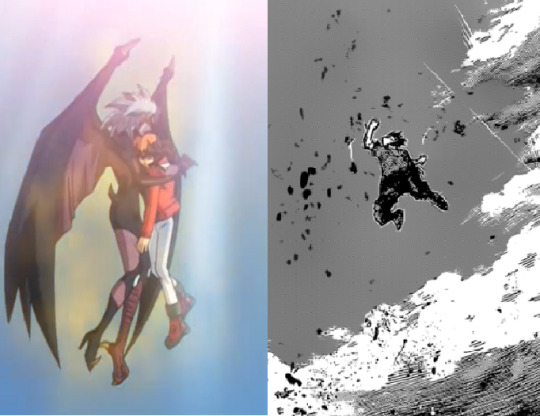
SHIGARAKI VS. YUBEL: HOW TO SAVE YOUR VILLAIN
The failure of Deku to save Shigaraki isn’t just a tragic conclusion for Shigaraki’s arc, it’s also My Hero Academia failing as a story. When I say the story failed, I mean the story has failed to answer any of the questions it asked its audience. It’s themes, character arcs, everything that communicates the meaning of the story to the audience is no longer clear.
Saving Shigaraki was the central goal of not only the story itself, but the main character Deku. By failing in its goal you can’t call this a good ending. In order to illustrate why this goal of saving the villain is so important to both Deku’s character and the central idea of MHA, I’m going to provide a positive example in Yu-Gi-Oh GX were the main character Judai successfully saves their villain. One of these stories fails, and the other succeeds. I will illustrate why under the cut.
BROKEN THEMES = BROKEN STORY
When artists draw they have to consider things like perspective, anatomy, shading, light, coloring. Drawing has rules, and it’s hard to produce good art without knowing these rules beforehand. If I draw something that has bad anatomy, you can criticize me for that.
Writing has rules, just like drawing. The rules of storytelling are important because writing is an act of communication. You can write whatever you want, just like how you can draw whatever you want, but if you break the rules the audience won’t understand what you are trying to communicate.
When I refer to MHA as a broken story, I am referring to the fact that it has broken the rules of storytelling. As this youtuber explains.
“I guess we should first define what broke and broken even means in this context. Has the story turned into an unintelligible mess? Not really. Value judgements aside, the narrative is still functional and fulfills the criteria of being a story. So how can a story that still functions be broken? Maybe to you it cannot. But to me a story that is still functional isn’t enough. What I mean when I say MHA is broken is that it’s lost something crucial. A codifying style of structure, pacing and payoff that until a certain point was the core of its identity.”
I could launch into a long-winded explanation of what themes are, but for the sake of simplicity I like to define themes in terms of “Ask, and answer.” The author asks a question to the audience, and then by the end of the story provides an answer. The audience is also invited to come up with their own answer which prompts them to think about the story on a deeper level. The question both MHA and GX are asking both its main characters and the audience is “Can you save the villain?” with the additional complicated question of “Should you save the villain?” This post will detail how both stories go about answering those two questions, and more importantly why those answers matter for the story.
With Great Power… You know the rest.
My Hero Academia and Yu-Gi-Oh Gx are actually similar stories once you get past their superficial differences. MHA is a story with way better worldbuilding, compared to a society where everything revolves around the trading card game, and people go to school to be better at a trading card game.
However, if you get past that. They are both bildungsroman, stories about the main characters growing up into adults. They both have an academy setting where the goal is for the main character to graduate and enter the adult world. They are both shonen manga. GX is the sequel of Yu-Gi-Oh a manga that ran in Shonen Jump the exact same magazine as MHA. The biggest point of comparison is their main characters, who both start out as young and naive who are driven by their admiration of heroes. Deku is a fan of All Might who wants to become a hero despite not having a quirk, because he loves All might who saves everyone with a smile. Judai’s entire deck archetype revolves around “Elemental Heroes’ and later “Neo-Spacians” who are all based on popular sentai heroes like ultraman.
The central arc for both characters is to grow up. Growing up for both of them not only requires figuring out what kind of adult they want to be, but also what kind of hero they want to be.
Now I’m going to drastically oversimplify what a character arc is.
A character arc first starts out with the character being wrong. Being wrong is essential because if the character is right from the beginning, then there’s no point in telling the story. A character often holds the wrong idea about the world, or has some sort of flaw that hinders their growth. The narrative then needs to challenge them on that flaw. It usually sets up some kind of goal or win condition. That flaw gets in the way of a character “winning” or achieving their goal, so they need to fix that flaw first. If their ideals are wrong, then they need to think about what the right ideals are. If they’re too childish, they need to grow up. If they have unhealthy behaviors or coping mechanisms, they need to unlearn it and require better ones. Otherwise, that flaw will keep sabotaging them until the end.
I’m borrowing the word “win condition” from class1akids here because it’s an incredibly appropriate terminology. Midoriya needs to do “x” in order to win, otherwise this victory doesn’t feel earned. The “x” in this case is usually character development. As I said before, a story where the main character hasn’t changed from beginning to end feels pointless. Especially in Deku’s case, he was already a brave, strong hero who would charge right into battle and defeat the bad guys in chapter one, so him defeating Shigaraki in a fist fight doesn’t represent a change.
The story sets up not only “What does the hero need to do to win?” but also “How does the hero need to change in order to win?” A character either meets these requirements before the end of the story, or they don’t and usually this results in a negative ending.
MHA in its first half quite clearly set up both the final conflict of saving the villains, and also that saving the villains is its “win conditions.” The hero shouldn't be allowed to win without first fixing this flaw.
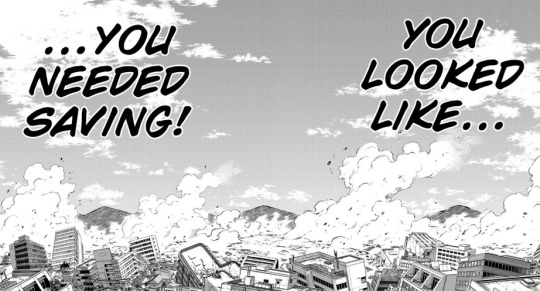
From this panel onward the central question Deku is forced to answer shifts from “Am I strong enough to defeat ShigarakI” to “Can I save Shigaraki?” However, much earlier than that All Might goes on to basically set up the win conditions of what makes the ultimate hero as someone who “Saves by winning, and wins by saving.”
All might: You can become the ultimate heroes. Ones who save by winning, and win by saving.
Therefore the story has set it’s criteria for what kind of hero Deku needs to become. If he wins without saving, then he’s failed to become what the series has set up as the Ultimate Hero.
Shigaraki and Yubel aren’t just narrative obstacles, or boss monsters to be killed like in a video game. They are narrative challenges, which means that the character can’t grow in any way if they don’t answer the challenge presented by the characters. They are villains who actively resist being saved, to provide a challenge for two heroes who define their heroism by saving others. The challenge they pose adds a third question to the story and the main characters.
"Can I save the villain?"
"Should I save the villain?"
"If I don't save the villain, then can I really call myself a hero?"
In other words the decision they make in saving, or not saving their final antagonist defines what kind of hero they are. In Deku’s case it’s even more critical he defines what hero he wants to be because the MHA is also a generational story, and several of the kids are asked to prove how exactly this generation of heroes is going to surpass the last one. The kids growing physically stronger than the last generation isn’t a satisfactory answer, Deku getting strong enough to punch Shigaraki hard is not a satisfactory answer, because we are reading a story and not watching a boxing match.
I’m going to focus on the last two questions though for a moment. Many people who argue against saving villains like Shigaraki argue he is a mass murderer and therefore isn’t worthy of salvation. However, the act of saving Shigaraki isn’t a reflection of Shigaraki himself, but rather the kind of hero Deku wants to be. It all boils down to Spiderman. In the opening issue of Spiderman, teenage Peter Parker is bitten by a radioactive spider and suddenly gains super strength, the ability to stick to walls along with other powers. However, being a teenager he uses these powers selfishly at first. He doesn’t feel the obligation to use his powers for other people, and therefore when he sees a robbery happening right in front of him he lets the robber go. However, because he lets the robber go, the robber then attempts to hijack a car and kills his Uncle Ben in the process. If Spiderman had stopped the robber then he might have prevented that from happening. He had the power to stop the robber, but he didn’t feel responsible or obligated to save other people. As a result Uncle Ben dies. It’s not enough to have power, ti’s how you use that power that reflects who you are, therefore: “with great power comes great responsibility.”
The choice to save Shigaraki actually has little to do with whether or not Shigaraki is redeemable, but rather how Deku chooses to use his power, and what he thinks he is responsible for reflects who Deku is as a person. Deku himself also clearly outlines how he wants to use his power, that One for All is a power for saving, and not killing.
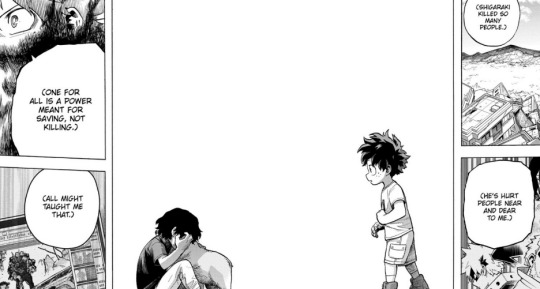
How he uses his power reflects Deku’s ideal in saving others, and therefore if he doesnt use his power to save, then he’s failed to live up to his ideals. It's not whether it's morally right to save a murderer like Shigaraki, but rather the way Deku wants to choose to use his power. It's about whether he feels the responsibility to save others.
Judai explores an incredibly similar arc to Deku. They are basically both asked what kind of responsibilities a hero is supposed to have, which is also a metaphor for growing up to handle the responsibilities of adulthood. As both characters start out with incredibly naive and childish ideas about what a hero is. Therefore realizing what a hero is responsible for is key to them growing as a character. However, Judai is different from Deku. In some ways he’s more like Bakugo. Judai is a prodigy who’s naturally good at dueling. He doesn’t duel to save others, but rather because duels are fun and he’s good at it. He’s very much like Bakugo, who admired All Might as a hero just as much as Deku did, but admired the fact that he was strong and always won rather than he saved others.
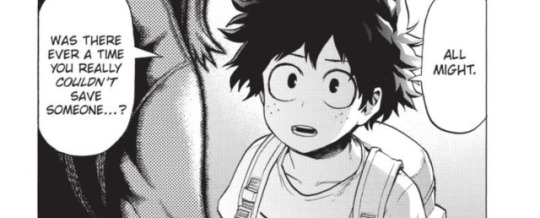
However, I would say both Deku and Judai are questioning what a hero is responsible for. They are both asking if they have the responsibility to use their power to save others. If they have to fight for other people, just because they have power. His first big challenge as a character comes from Edo Phoenix, who calls out Judai for not thinking through what it means to be a hero, and what responsibilities heroes carry. Judai duels because he thinks it’s fun. He will show up to duel to help his friends, but that’s because he’s the most powerful person in the group. Even then it’s because he finds fighting strong opponents to be enjoyable. Bakugo will beat up a villain, but for him it’s more about winning then if the action will save someone or not.
Judai is more often than not pushed into the role of being a hero, he doesn’t play the hero because he’s a particularly selfless person, and he’ll often avoid responsibility if not forced. He has power but no sense of responsibility and the narrative calls them out as a problem.
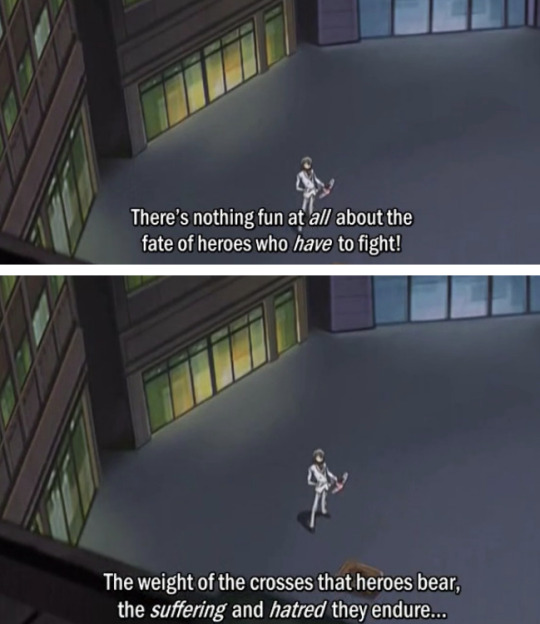
Edo: Can you even fathom that, Judai?
For Judai, he can’t understand the responsibility of being a hero. For Deku, he idealizes heroes so much he can’t understand that there are people out there the heroes have failed to save. These two callouts towards Deku and Judai are discussing similar because they’re both discussing where a hero’s responsibilities lie. Is a hero responsible for saving everyone? Is someone strong like Judai responsible for using their strength to help other people?
Judai’s arc continues into the third season where he’s not shown to just be naive but ignorant. He’s not just childish, he actively resists growing up because he doesn’t want to take on adult responsibilities.
THe same way that Deku just decides not to think about whether or not All Might failed to save people in the panels above. However, in Judai's case he's actively called out for his choice to remain ignorant.
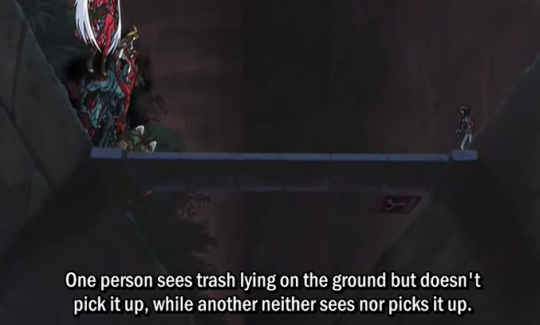
Satou: Now, which one is at fault? Judai: Isn’t it the guy who saw it, but didn’t pick it up. Satou: Not quite. If one is aware of the trash that fell, it may be picked up someday. But there is no possibility fo the unaware one ever picking it up. Judai-kun you are the foolish one unaware of the trash that has fallen. Judai: Are you calling me out for how I am? Satou: Your behavior towards me was atrocious. The worst was attending class only for credit, even if you were there you only slept. Judai: Yeah, I know. I was all bad, but it wasn’t that big a- Satou: It is important. You see, one by one, the students inspired by your attitude were losing their motivation. Now if you were a mediocre duelist, then this would not be an issue. Satou: However, you are the same hero who defeated the three mythic demons. Every single student in the academy admires you. You should have been a model for this academy. Judai: Me, a role model? Are you kidding? I just do whatever I feel like doing. Satou: Great power comes with great responsibility. Yet, as you remain unaware of that, you’ve spread your lethargy and self-indulgence.
seems like a minor issue, but look how Judai responds to the accusations. “I just do whatever I feel like doing.” Satou is arguing that Judai should pay attention to the influence he has on others because of his power, because how he chooses to use that power affects others. However, Judai chooses to actively not look at the consequences of his actions because he doesn’t want to take on that level of responsibility, and therefore he’s looking away from the trash.
While it seems like it doesn’t matter in Satou’s specific example, not thinking of the consequences, or how you use your power can have unexpected consequences. Spiderman doesn’t feel like it’s his responsibility to stop a bank robber, and that bank robber shoots his uncle. You could still argue it’s not Spiderman’s responsibility to stop every crime in the world, and I guess no one owes anyone anything from that point of view - but Spiderman failing to act responsibility had the consequence of directly hurting someone else.
Spiderman has to live with that consequence because it was his own Uncle that was hurt. This is where we really reach the duality of Judai.
In GX, Judai is, symbolically speaking, The Fool of the Tarot Deck, the Novice Alchemist — a person brimming with infinite potential, yet one who is also supremely ignorant, who walks forward with his eyes closed and often unknowingly causes harm in his great ignorance. In this, he is very much the embodiment of the faults we most commonly associate with teenagers — selfishness, recklessness, shallowness, a lack of dedication or empathy when it’s most needed. Like most people, he has good traits that work to balance out some of the above, but his narrative path through GX ends up being that of the flawed hero undone by his faults — and then that of the atoner, the repentant sinner. In his case, the mistakes of his teenage years are the catalyst for his growth from a boy into a man burdened with duty and purpose. Judai is someone with infinite potential, with great power, but also ignorant on how he should use that power, and that makes him an incredibly flawed hero who needs to learn how that power should be used.
Deku similarly exists in a society where heroes deliberately turn a blind eye to the suffering of a certain type of victim. Shigaraki’s speech heavily resmebles Satou’s speech about garbage on the side of the road.
Shigarali: "For generations you pretended not to see those you coudln't protect and swept their pain under the rug. It's tainted everything you've built."
Deku shares Judai’s ignorance, because he’s not only a part of a system that doesn’t even see trash on the side of the road, but he also worships heroes so much that he’s incapable of criticizing them. If Deku saw the flaws of heroes, but at first didn’t have the courage to speak out, but eventually gained the courage that would be one thing. However, if he doesn’t see the flaws of heroes, then the problem will never be fixed.
There are also consequences for both Judai and Deku failing to use their powers responsibly. These consequences take the form of the villains who came about because of all of society’s ignorance to the suffering of victims (Shigaraki) and because of the main character’s ignorance to their suffering (Yubel). Shigaraki and Yubel are also explicitly victims that the heroes failed to save, turned into villains who are active threats to the heroes.
Should I save the villain?
The answer is yes, because the decision to save is reflective of the kind of hero each character wants to be. Each story clearly sets up that Deku and Judai aren’t punisher style heroes who shoot their villains, they are being set up as heroes who save. Deku needs to “save by winning.” As for Judai, a big deal is made of Judai’s admiration for another character Johan who represents a more idealistic kind of hero. Johan unlike Judai is someone who duels with a purpose, something Judai outright says he admires because he’s empty in comparison.
Judai: Johan what have you been dueling for? See, it’s about fun for me… Well, for the surprise and happiness too. I guess I do do it for the fun. Sorry, I guess I put you on the spot by asking out of nowhere. Johan: What’s this about Judai? Judai: It’s nothing. Johan: I suppose there is one goal I have. Johan: Even if someone doesn’t have the power to see spirits, they can still form a bond with a spirit. That’s why I do it for people like him. [...] Johan: I'll fight for everyone who believes in me, and I'll do it with my Duel Monsters. Judai: I'm jealous you've got feelings like those in you.
Becoming a hero who uses their power to help others isn’t just a goal the story sets for Judai, it’s a goal that Judai sets for himself because of his admiration for Johan. Johan represents the idealistic hero Judai wants to be, but is also held back from because of his personality flaws. Johan represents the kind of heroic ideal that Deku is aspiring to be.
Johan’s ultimate goal isn’t punishing the wicked, but to use his power to save others.
Johan: Judai, it was my dream to save everyone through my dueling!
The story sets up the idea that it’s not enough for Judai to simply be strong, he’s also challenged to become a savior who uses his power to help others like Johan. Deku needs to “save by winning” and Judai needs to “Save everyone through his dueling.” However, Johan also adds another condition to what saving means. His idea of saving isn’t to defeat a villain, but rather his dream is to help connect spirits and humans together, even if there are humans who can’t see spirits. Johan doesn’t save people with the power of physical force, but rather the power of human connection.
Should I save the villain?
Here the answer is "Yes", because wants to become more like Johan someone who uses their power to help others not just for themselves. Then we reach the third question
If I don't save the villain, can I really call myself a hero?
It once again comes to power and responsibility. Heroes have great power, and they are responsible in how they use that power, if they use it irresponsibly then there are consequences. Shigaraki wants to destroy hero society, because the heroes irresponsibly use their power to turn a blind eye to everyone’s suffering.
People suffer when heroes fail to live up to their responsibilities. The entire conflict of season 3 is created by Judai failing to save Yubel. If Judai had helped Yubel when they most needed it, instead of abandoning them, then Yubel would never have been twisted by the light of destruction, would never have attempted to teleport the school to another dimension, would never have attacked all of JUdai’s friends.
These consequences matter. Deku can turn his eyes away from Shigaraki’s suffering, but let’s say a hero failed to stop a robbery, or rather he didn’t even try, and because of that his mom was shot and died in the street. Would Deku consider the man who failed to stop a bank robbery a hero? When Spiderman let a bank robber go instead of trying to stop him, was he being a hero in that moment? Both the stories and the characters themselves have defined heroes as people who use their powers to save others, therefore if Judai and Yubel fail to save their villains then they can’t be called heroes by the story’s own definition. Now let’s finally return to the question of "Can I save the villain?"
Was there ever someone you couldn’t save?
m going to start with Yu-Gi-Oh Gx as a positive example of how to save your villain. Gx works for two reasons. One, it’s established from the start that Yubel isn’t beyond salvation, and two, it makes it so Judai can’t win without saving Yubel. The conflict of the story does not end until Judai makes the decision to save Yubel. In some ways the writing is even stronger because Judai is directly responsible for the pain and suffering that Yubel went through that turned them into a villain in the first place. Yubel isn’t just a victim, they’re specifically Judai’s victim.
Yubel is a duel spirit who is also essentially Judai’s childhood friend. A duel spirit just like the kind that Johan wants to save. During their childhood Yubel got too overprotective of Judai, and started to curse his friends for making him cry or upsetting him in any way. Until everyone Judai’s age started avoiding him and Judai became all alone with only Yubel for company. Judai’s decision was to abandon Yubel at that time. He took the yubel card and shot them into space, hoping that being bathed in space rays will somehow “fix” what was wrong with them. I know that’s silly but just go with it. Judai abandoning Yubel had the unintended consequence of Yubel being subjected to the light of destruction, a corrupting light that subjected Yubel to years of pain. This pain literally takes the form of Yubel burning alive.
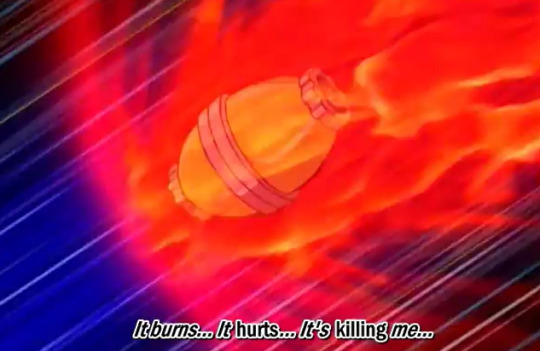
Yubel connected to his dreams called out for Judai every night, only for Judai’s parents to give him surgery that repressed his memories of Yubel causing him to forget them entirely. Yubel then spent the next ten years alone in space, continuously subjected to painful torture, with their cries for help being ignored.
"I was suffering even as you came to forget about me..."
Yubel is then met with the question of how can Judai treat them this way if they loved him so much? As from Yubel’s perspective, they’ve only ever tried to protect Judai, only for Judai to not only throw them away, but subject them to painful torture and ignore their cries for help. Judai effectively moves on with his life, goes to duel academy, makes friends while Yubel is left to suffer in silence all but forgotten. This is where Judai’s ignorance has serious plot consequences.
It’s not just the pain that Yubel endured that made them snap. It’s that their pain went ignored.
Yubel holds out the faint hope that Judai will answer their calls fro help until they finally burn up upon re-entry into earth’s orbit. At which point they’re left as nothing more than a single hand crawling on the ground. Yubel who cannot fathom why Judai would cause them so much pain, and then forget about them, convinces themselves that Judai must be causing them pain, BECAUSE he loves them.
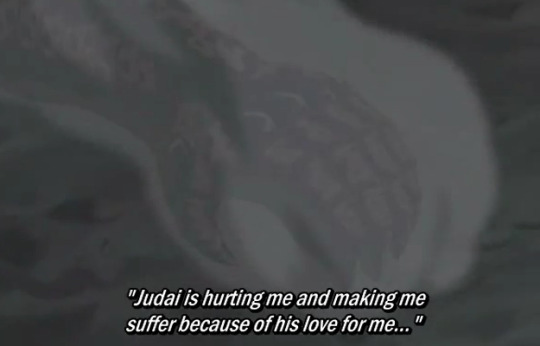
But you see, I couldn't possibly forget about you in the time that I've suffered...
Judai is allowed to move on with his life, to make friends, to spend the next ten years doing so while Yubel is subjected to ten years of agony. When they finally escape their painful torment, they see all the friends Judai has made while they’re left alone and forgotten. However, Yubel’s goal isn’t revenge. Rather, it’s to make Judai share and recognize their pain. WHich is why I said it’s not the fact that they were made to suffer, but their suffering is ignored. Yubel’s entire philosophy revolves around the idea that sharing pain is an expression of love, and that they and Judai share their love for each other by hurting each other.
"That's why I sought to fill all those linked to you, your world, with both sadness and anguish..."
For Yubel, making all of Judai’s friends suffer and Judai themselves suffer is a way of making them and Judai equals again. They want to show “their love” for Judai, but it’s more about forcing Judai to recognize the pain he’s caused them by forcing him through the same pain. Yubel’s philosophy of sharing pain is actually a twisted form of empathy.
They’re not entirely wrong either, that even people who love each other can cause each other pain, and that if one person is suffering alone in a relationship or the suffering is one-sided then there’s something wrong with that relationship.
Yubel: I get it now… You weren’t in love, with Echo. Yubel: No.. you may have loved her just enough to clear the conditions in palace for you to control Exodia, but the you didn’t truly love each other. Yubel: You were only unfairly hurting her, while you stayed unharmed. You wouldn’t suffer. You wouldn’t suffer. You wouldn’t be in pain. Amon: What are you getting at? Yubel: I’ve been hurt! I’ve suffered! I’ve been in pain. That’s why I’m making JUdai feel the same things I did!
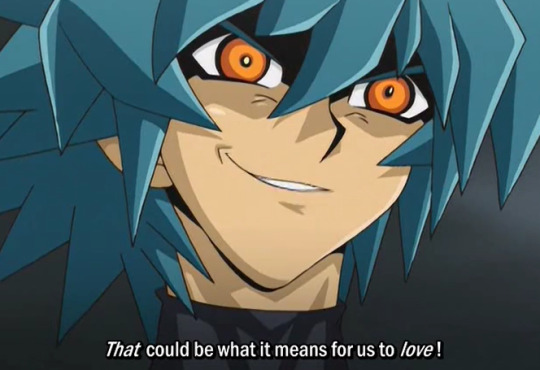
Yubel’s twisted theory of love, is a pretty thinly veiled cry for empathy.
They break out into tears when talking to Amon about the way they’ve hurt and suffered. They clearly state upfront that their goal is for Judai to recognize their love. One of the first things they say to Judai is a plea for Judai to remember them.
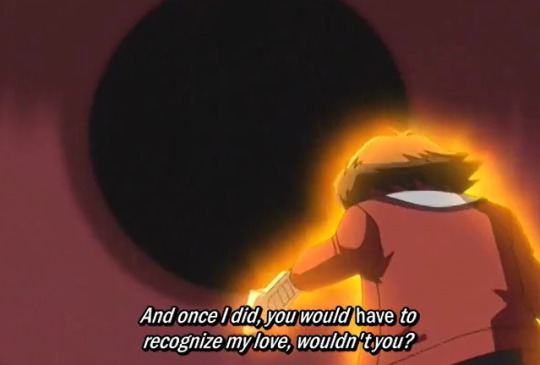
Yubel is presented as a very human character suffering through a lot of pain throughout their entire villai arc, they break down into tears multiple times, they cry out in agony, they're visibly suffering and you see their mental walls begin to break down when Judai denies them any empathy.
Yubel is actually incredibly clear and straightforward about their desire to be saved by Judai. However, Judai doesn’t lift a single finger to help Yubel the entire arc, even though they themselves admit they are directly responsible for Yubel’s suffering but they helped create who they are today.
Judai plunges into a different dimension and gives up everything to save someone, but it’s Johan, not Yubel they try to save. You have Johan, the perfect friend, and perfect victim that Judai gets obsessed over and will not stop at anything to save, and then you have Yubel, the imperfect victim that is actively harming Judai and all of his friends that Judai chooses to ignore. The whole season Judai only focuses on saving the perfect victim Johan, and this is clearly shown to be a flaw. Judai doesn’t just ignore Yubel to save Johan, he also ignores every single one of his friends.
Judai only caring about saving Johan, and deliberately ignoring and abandoning the friends who came with him to help, essentially abandoning them the way he did Yubel leads to another consequence. After he abandons them they get captured, rounded up, and actually die and become human sacrifices.
Losing his friends, causes Judai to snap. Judai becomes the supreme king and decides power is all that matters; he starts killing duel spirits en masse in order to forge the super polymerization card. Which means being left alone, suffering alone, being abandoned by everyone causes Judai to snap the exact same way that Yubel did.
In fact Judai is only saved from his darkest moment, because two of his friends sacrifice their lives, trying to get through to him and appeal to his humanity. At that point Judai’s friends could have just chosen to put him down like a mad dog, to punish him for the amount of people he’s killed, but instead they try to save him because of their friendship.
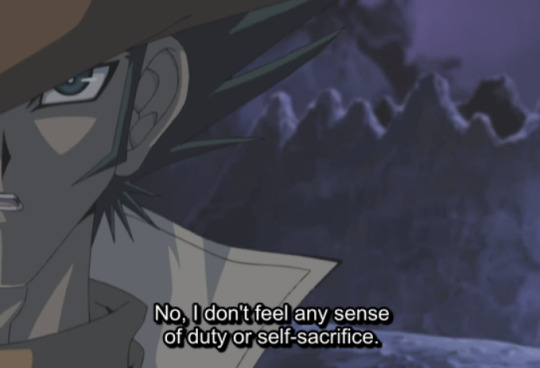
I just want to save my friend. That is all.
By the time Judai is facing Yubel in their final fight, Judai doesn’t have the moral highground against Yubel in any way whatsoever. They’ve both lashed out because of the pain they endured and killed countless people in the process of lashing out. The only real difference between them is that Judai is lucky. He had friends to support him at his lowest point, while Yubel didn’t. Does Judai learn from Jim’s example, and go out of their way to save Yubel the same way they were saved because Yubel is still a friend? Nope, Judai tries to kill Yubel at this point.
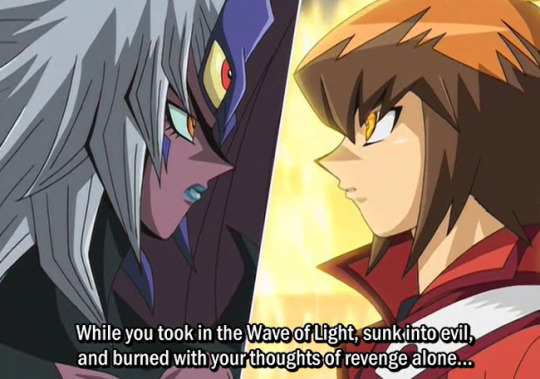
I made a lot of friends... And they all taught me something… real love is wide enough, large enough and deep enough to fill the universe. Your so-called love is only a conceited delusion.
Like, Judai, sweetie baby honey darling. How was Yubel supposed to make friends when they were floating in the empty void of space?
Judai hasn’t learned, they are still ignorant, and still turn a blind eye to Yubel’s suffering. After all if his love is wide enough, large enough,and deep enough to fill the universe then why don’t thy have any room in their heart whatsoever for empathizing with Yubel?
Judai making friends while Yubel was trapped in space doesn’t make Judai a better person than Yubel, it makes Judai lucky. Judai doesn’t even appreciate that luck, because he treats his friends like garbage. It’s not about whether Yubel is worthy of salvation, because Judai is a mass murderer and his friends still went to great lengths to save them anyway. It’s that Judai doesn’t want to empathize with Yubel, because they still want to remain ignorant and irresponsible. Judai wants to continue playing hero, with a very black and white definition of what a hero is. By this point Judai’s killed lots of people, but if he makes Yubel the villain in the situation, he can keep playing hero. He doesn’t have to look at himself and what he’s done, because blaming everything that happened on Yubel and then putting Yubel down like a mad dog allows Judai to absolve his own guilt. Judai practically ignores Yubel’s cries for help, even when Yubel spells it out for them.

I couldn't have lived with the heartache unless I felt that I was being loved...
At this point Yubel themselves acknowledges that their love was just a delusion. That it was a coping mechanism, because they couldn’t live with all the pain otherwise. WIthout it they would have just died, which makes Judai unmoved. The implication here is that Judai thinks yes, Yubel should have just died in that crater. It would have been easier for Yubel to die a perfect victim, then for Yubel to crawl out of that crater and go on to hurt other people. While that may be true the same can be said for Judai - it would have been better if Judai died rather than become the Supreme King. His friends could have put him down like a mad dog, you could have even called that justice - but they didn’t. Judai making no attempt to save Yubel isn’t because he thinks it’s morally wrong to save someone who’s killed as many people as Yubel has, or because he thinks he can’t forgive Yubel, it’s because Judai is taking the easy way out. Johan is a nice, easy victim to save, because he’s Judai’s perfect boyfriend, while Yubel is a complex victim that requires Judai to understand their suffering. Even the act of saving Johan isn’t about Johan himself, it’s about the fact that Judai feels guilt over Johan’s disappearance. What Judai wants isn’t really to save a friend, but to stop feeling guilty over that friend. Judai isn’t just disgusted by Yubel’s actions towards his friend, he also wants to avoid the guilt he feels over causing all of Yubel’s suffering, because it requires acknowledging the complex reality that he is both victim and perpretrator in this case, just as Yubel is both victim and perpetrator.
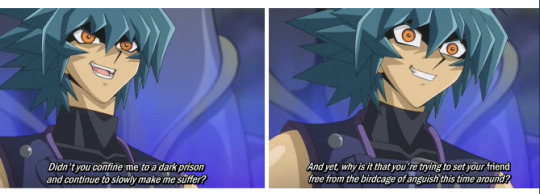
So how can an arc where Judai doesn’t try to save Yubel until the last possible minute, be better than an arc where Deku makes it his goal for the final act of the manga to save the crying boy in Shigaraki?
It’s because the story does not let Judai get away with his continual refusal to empathize with Yubel. Yubel’s entire character revolves around empathy, in the form of sharing pain. As a duel monster, Yubel’s effect is that they are a 0/0 attack monster who is immune to all damage, but when you attack them they deal all the damage back to you. Which means that Yubel will respond to all the pain they feel, by causing you just as much pain in return. Yubel is not a character who can be defeated in a fight, or a duel. In fact they’re the only Yu-Gi-Oh villain who never loses a duel once. The most Judai can do is duel them to a draw, and they draw three times. Yubel wins against everyone else who challenges them. In a way Yubel is like Shigaraki, the ultimate, unkillable enemy that can’t be done away with violence. Judai’s refusal to empathize with Yubel or attempt communication also makes them worse, every time Yubel is hurt they escalate. THe more Judai hurts them, the more they will hurt in return, it’s a cycle that will never be broken simply by killing Yubel, because Yubel is unkillable.
Not only that but the story has gone to great lengths to show that saving Yubel is the correct course of action. If Judai doesn’t save Yubel, he’s basically spitting on the selflessness Jim showed in saving him. In fact if he doesn’t save Yubel, Judai is contradicting his own words on what makes a good friend. Sho once asks Judai after witnessing his brother change, what he should do if a person you lov ehas changed into an entirely different person. What if they're a person you don't even recognize any more? A person you don’t even necessarily like anymore?
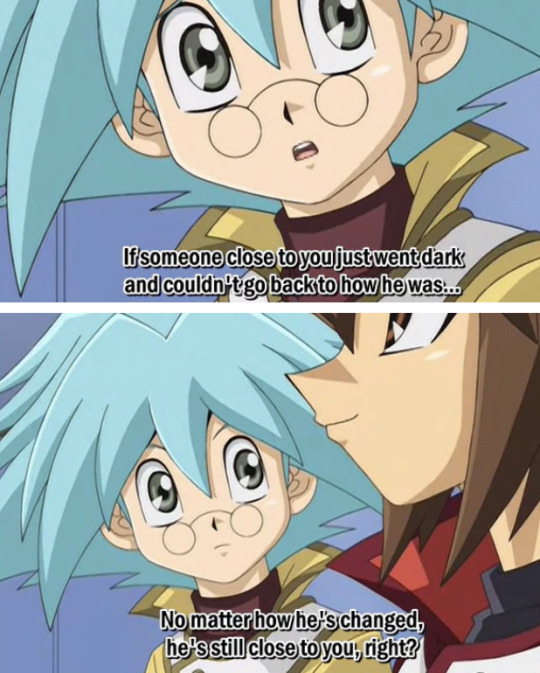
That's why if it were me. I'd probably just be looking after him until the very end, even if I didn't like him. I'd do it cause I think it'd prove that I care about him.
Judai doesn't even say that Sho is obligated to save his brother or morally redeem him, just that he has to keep looking at him instead of turning away or ignoring him.
Judai is being a bad friend, by his own definition. By choosing to deliberately look away from Yubel, Judai’s not living up to his advice for Sho for how you treat people you care about.
Which is why the resolution for Judai and Yubel’s arc is so important, because it’s done by Judai finally acknowledging Yubel’s pain, and promising to watch over them from now on, words that are followed by the action of physically fusing their souls together so they’ll never be alone again. Judai doesn’t just say pretty words about how they won’t ignore the crying child inside of Yubel, but instead he makes a sacrifice to save Yubel at risk to themselves to show their words are backed up by actions. Judai says Yubel will never be alone again, and then he commits.
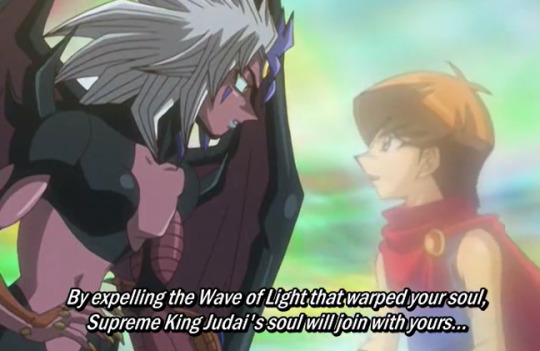
"And even if that means I won't exist anymore... I don't care."
Judai has resolved his character arc by this action, because Judai is finally taking on responsibility and that responsibility is watching over Yubel, so the two of them can atone together. Judai even says himself this isn’t an act of sacrifice on his part, but rather him finally accepting adult responsibilities.
Judai: I wouldn't sacrifice myself for you guys. I'm just going on a journey to grow from a kid into a man.
Judai needed to save Yubel to complete his character arc and grow as a person. If Judai hadn’t saved Yubel, he would have still remained an ignorant child. By learning not to turn a blind eye to Yubel’s pain, and also smacking sacrifices and physically doing something to atone for the way they ignored Yubel up until this point they’ve not only saved Yubel they’ve also done something to address their wrongs. This also continues into the fourth season where Judai’s personal growth results in him learning what kind of hero he wants to be as in Season 4 in order to atone for the spirits that Judai slaughtered, he decides to leave his friends behind and walk the earth with Yubel helping spirits and humans get along with each other. In fact Judai’s final speech as a character isn’t even about how strong he is as a hero, but how weak he is as a person.
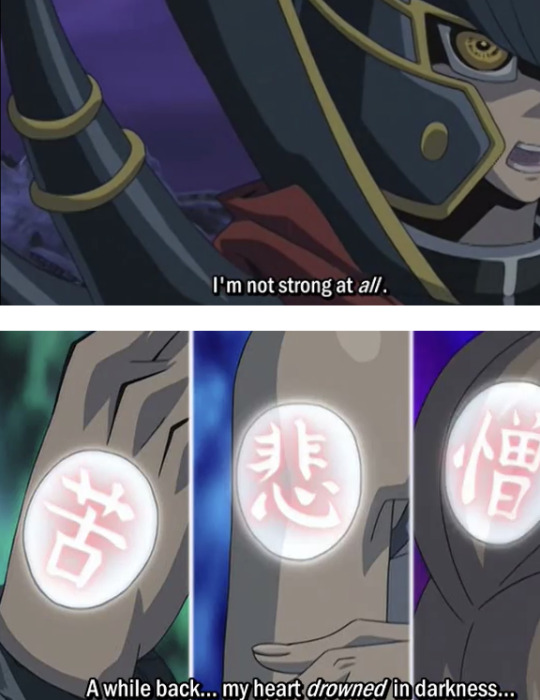
And I put my friends through some rough times. Form that, I figured a few things out... all I can do is believe in them.
The lesson Judai learned is because he’s weak, he needs to empathize and believe in other people the same way that his friends once believed in him when he was at his lowest point. Judai’s not the strongest hero, he’s the weakest one, but that gives him the ability to empathize with people who were lost just like he was, and guide them back from the darkness.
The story of how Deku became the worst hero.
I’m going to say this right now it might turn out next week that Shigaraki is just fine, and he’ll use the overhaul quirk to reconstruct his body. However, even if that happens Deku has completely failed at his goal of saving Shigaraki for the reasons I’ll illustrate below. In theory, Deku’s arc of saving Shigaraki, and therefore winning by saving should be much easier for the story to accomplish and also much less frustrating to watch. After all, Shigaraki has been around since the beginning of the manga, he’s literally the first villain that Deku faces. He’s also the first villain that Deku talks to, where he brings up the idea that there were some people All Might failed to save. There’s also many intentional parallels between the two characters, the entire manga is about their parallel journeys of becoming the next generation hero and the next generation villain. Shigaraki even directly quotes the line at one point that all he wanted was for someone in his house to tell him he could still be a hero, the same line Deku said in the first chapter was that he wanted his mom to tell him to be a hero instead of apoalogizing to him for being quirkless.
Not only is the setup for Shigaraki and Deku made obvious (Deku can redeem Shigaraki by telling him that he can still be a hero too), but Deku himself states out loud that he wants to save the crying child inside of Shigaraki.
Judai runs away from Yubel the whole time, whereas Deku is running towards Shigaraki and actively makes it his goal to understand Shigaraki and continue to see him as a human being rather than a villain. The story also makes it clear that saving Shigaraki is necessary to saving hero society as a whole. After all Yubel is just Judai’s victim. Whereas Shigaraki is the victim of all of society. He’s the crying child who was ignored. The cycle won’t be broken if heroes continue choosing to ignore people like Shigaraki, because more victims will grow up to replace him.
Shigaraki: Everything I've witnessed, this whole system you've built has always rejected me. Now I'm ready to reject it. That's why I destroy. That's why I took this power formyself? Simple enough, yeah? I don't care if you don't understand. That's what makes us heroes and villains.
Shigaraki rejects the world because the world continues to reject him. THe solution to this problem is not rejecting Shigaraki, because Shigaraki won’t go away, the system will just continue to reject people like Shigaraki. As long as heroes and villains don’t understand each other, they’ll keep being forced to fight and the conflict won’t end, because hero society is what engineers it’s own villains.
clear as day by the story itself. If the objective of saving Shigaraki is clear, then how exactly did the story fail in this objective? What went wrong? In this case it’s a failure of framing, and breaking the rules of “show don’t tell.” Stories are all about actions and consequences. When a character makes a certain action in a story, the way other characters around them, the world, and whatever consequences that action frames that action in a certain light. It provides context for how we are supposed to interpret that character in that moment.
For example, when a character does something wrong and another character directly confronts them over what they did wrong, that frames them as in the wrong. The story is criticizing the character for what they did wrong. Context is everything in a story. Stories are just ideas, so they require framing and context to communicate those ideas for the audience. Certain character attributes can be strengths or flaws depending on the context. My go to example is that if you put Othello in Hamlet, the conflict would be resolved in five seconds because Othello’s straightforward personality and determination would have him kill Hamlet’s uncle without questioning things. Whereas, Hamlet constantly questioning and second guessing himself would lead to the worst ending possible. However, if you put Hamlet in Othello, then Hamlet wouldn’t fall prey to Iago’s manipulations, because Othello doubts and questions everything so he wouldn’t believe Iago the way Othello did.
Hamlet’s contemplative and introverted nature can be a strength in one situation, and a flaw in another. Othello’s tendency to act without thinking things through can be a strength in one situation, and a flaw in another. Context matters, because context tells you how you’re supposed to interpret a certain characters actions, and therefore tells you more about that character. This is why people repeat “Show don’t tell” as the golden rule of storytelling, it’s one thing to say something about a character, it’s another to us the characters actions in the story itself to show them something about the character.
What’s even worse then breaking the rules of show don’t tell however, is telling the audience one thing, and then going onto show in the narrative something completely different. In that case the narrative becomes muddled and confusing to read. If I the narrator say “Hamlet is someone who overthinks everything” and then in the story Hamlet walks up to his uncle and kills him with no hesitation, then the narrator is straight up unreliable. It becomes impossible to tell as an author what message I’m trying to get across about these characters, because I’m telling you one thing and showing another.
This is why the writing fails in the second half of My Hero Academia because we are constantly told one thing, but then the story shows something entirely different and sometimes even contradictory to the thing we are being told.
Judai is a much worse hero than Deku, he always runs away from Yubel, and we’re never directly told that he’s supposed to save Yubel either. However, the narrative is incredibly consistent. Judai’s behavior of running away is consistent with his character. All the other character call Judai selfish for abandoning his friends (and they’re not even talking about Yubel). Judai is never painted in any positive light for his actions, therefore we as the audience understand Judai’s behavior is wrong and he needs to fix it. The narrative makes it clear that Judai needs to grow up, and Judai is never rewarded for his refusal to grow up, he’s ruthlessly chewed out, not by his enemies but also by his own friends. However, the narrative isn’t merciless on him either. Season 3 of GX is dark, but it’s not grimdark. Even when Judai loses his way, he’s still shown love and compassion by those same friends who go to great lengths for his sake. The narrative criticize Judai but it never insists that he’s beyond redemption and needs to be put down like a mad dog.
The message is very clear, that not only does Judai need to grow up, but he also deserves the chance to grow and change, which is why he should give Yubel a similar chance. In comparison the story sets out this clear narrative arc for Deku of understanding Shigaraki, but it never challenges him for failing to understand Shigaraki. If you listen to what the narrative says, how other characters describe Deku, and what Deku himself says and only read it on a surface level then yes, Deku’s goal is to save Shigaraki. If you analyze actions however, he is in effect just like Judai he never takes any meaningful action or steps towards Shigaraki, nor does he think of what saving Shigaraki might look like or entail.
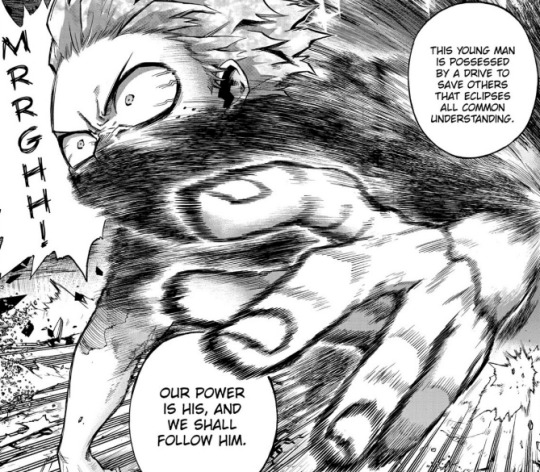
The story describes Deku as someone who is possessed by a drive to save others that eclipses all common understanding, but does the story give us any examples of that behavior?
Judai is characterized as a selfish, irresponsible child, and the story gives us countless examples of his immaturity and how it hurts others. Does the story of MHA do the same for Deku's purported virtues? Let’s run through Deku’s actions, step by step, the actions themselves and how they are framed in order to find any evidence that Deku possesses this drive to save others. Does Deku reflect at all on the question of:
Can Shigaraki be Saved?
Deku leaves on a journey to try to understand villains. When he makes a perfunctory attempt to understand and empathize with Muscle, and Muscle replies that some people are just evil does Deku keep trying to reach his heart? Nope, he just punches him.
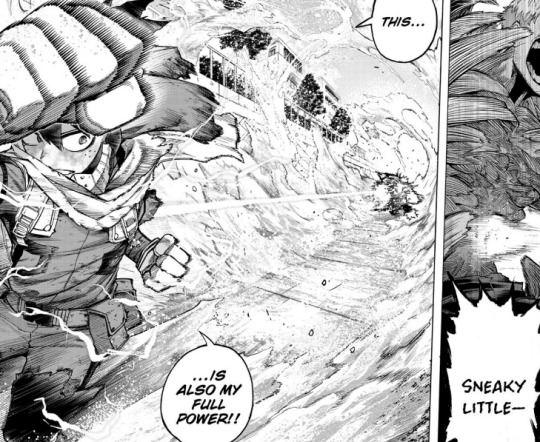
Well, if he’s failed in his goal of understanding a villain then does the story call him out on his failure? Does Deku face any sort of narrative consequence for that failure? Is he framed negatively for failing to understand Muscle, the same way that Judai is framed for abandoning Yubel? Nope. Deku doesn’t express any frustration at all over is inability to reason with Muscle. There’s also no negative consequence for Deku just choosing to punch muscle, it turns out that there was no reasoning with Muscle and some people are just bad eggs so Deku was right. It’s okay for characters to fail, but if a character fails and it’s not framed by the story as a failure then the writing itself as failed. Why even bother to include this scene in the first place if it doesn’t advance Deku’s character in any way? This scene in spite of showing Deku failing to understand someone actively paints Deku in a positive light, because of how much stronger he is ow that he can OHKO a guy that gave him trouble all the way back in the camp arc.
This scene doesn’t tell anything about Deku as a character, it just makes him look cool. In fact that’s precisely the problem, Deku isn’t adequately challenged as a character, because he’s never allowed to fail. Even when he does obviously fail at the things the narrative set out for him to do, he’s never challenged on those failures, because the priority isn’t to make Deku grow, it’s to make Deku look good. As I said before, Judai is the hero because he’s the weakest. Deku is the hero because he’s the strongest. Well, next a big flaw on Deku’s part is that he worshippd the same heroes that were making the world corrupt. Heroes like Endeavor who created people like Dabi. So, does Deku take action to either criticize the older generation of heroes, or separate himself from them in order to try to be better than them? Nope, he teams up with them. Not only that, Deku can’t do something as simple as tell Gran Torino out loud about his plans to save Shigaraki. If Deku feels that Shigaraki is worthy of salvation then he should at least try to make an argument here about his ideal of saving others.
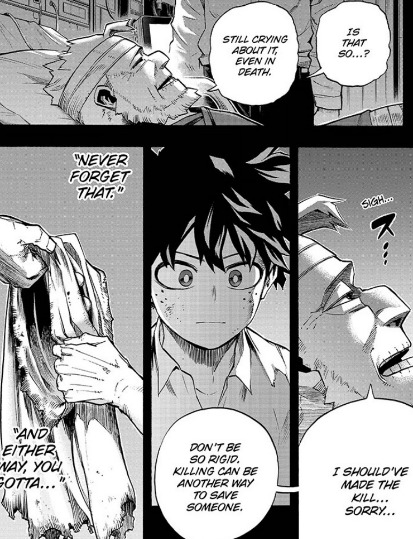
Now here’s the thing, if Deku hadn’t directly looked at the camera and told us he wanted to save Shgiaraki, would we be able to deduce his intentions from his actions? If you took away all of Deku’s internal monologue, and just showed him punching Muscular and saying nothing when Gran Torino says he may have no choice but to kill Shigaraki would anything about Deku’s actions indicate that he wants to save Shigaraki? Let me use avatar the last airbender as a positive example for a moment. People say that Aang’s desire to spare Ozai’s life comes out of left field, but like if you analyze Aang as a character down to their bending, and the way they react in situations they always prefer de-escalation, or taking a third option as opposed to confronting things head on. It’s literally why Toph says Aang has trouble learning earth bending, because as an airbender, he always tries to look for some other way to solve the problem, instead of a direct confrontation with force. As early as season one, Aang tells Zuko someone who has tried to kill him several times that he was friends with someone from the fire nation one hundred years ago and in a different situation they could be friends. Aang’s desire to save the Firelord may not have been told to us until the last possible minute, but Aang’s aversion to violence has always been a part of his character from the beginning. However, Deku never shows any similar aversion to violence. There’s basically no example where he ever tries to de-escalate a situation, or he avoids a conflict by seeking a third option.
Anyway, let’s move onto the next example. In the confrontation where Lady Nagant fights Deku, when Deku learns the fact that the heroes were employing government hitmen to attack people for uhh… exercising free speech does Deku give any reaction to this information? When Lady Nagant says that Deku is only going to bring back the status quo, does he show her any meaningful evidence that he won’t do that.
Deku’s response is because the world is so grey, he needs to extend a helping hand to others. Which you know what thay could be a response. Deku saying that his response to the corruption of the hero world is that he now understands that society led some people down the wrong path, so his way of addressing the wrongs of that society is lending a helping hand to as many people as possible even people he used to think was irredeemable.
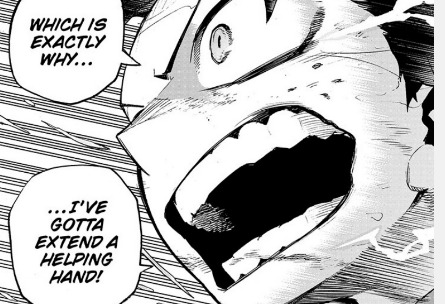
I will give Deku the benefit of the doubt, I think this is an acceptable answer. I can’t save everyone, but that’s not going to stop me from trying to save as many people as possible and maybe I can save people who were this society’s victims on the way too. However, does Deku demonstrate his resolve to extend a helping hand in any meaningful way.
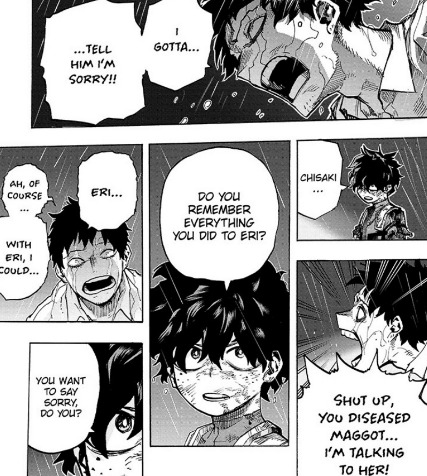
Deku is met with an armless, insane Overhaul who’s begging for someone to help heal his father figure in the Yakuza from his coma. This isn’t like Muscular who insists that there’s no helping him, Deku is met face by face with someone asking him for help. Deku’s gotta extend a helping arm whenever he can, because he knows some people were abandoned and led astray by this society… Unless that person is someone he doesn’t like personally. At which point he only helps them on a conditional basis. We are told Deku will save anyone and everyone, but Deku is met face to face with an armless man who is begging for help and Deku’s does nothing to help him. Deku’s not criticized for refusing to help overhaul either, it’s never brought up again. When Deku begins to experience a mental breakdown because of all the people he’s trying to help in the Dark Deku arc, we are told this is the result of Deku trying to save everyone, but we do not see Deku attempting to save a single villain after Muscular and Nagant.
He exhausts himself beating up villains that AFO sends after him, and only helping innocent civilians. Which would be fine if this arc were about how Deku is running away from his real responsibilities the same way that Judai was running, but that’s not what we’re being told. We are told that this is all part of an arc of Deku learning to understand villains and be a hero.
Deku is asked “Can you save Shigaraki?” by the story, but Deku never at any point has to deliberate on that question. Judai doesn’t deliberate on that question either, but him choosing not to think about things and stay ignorant is the point.
It’s actually fine to make Deku stagnate as a character. It’s fine to have him take the easy way out by just punching villains and giving up on them after one conversation. It’s fine for him to be empathetic to other people’s suffering, or even self-righteous. It’s fine for him to be ignorant.
He could be all of those things if it was a part of a narrative teaching him to unlearn his behavior. In fact the narrative might have been better if Deku started out by saying he didn’t want to save Shigaraki, that there was no choice but to kill him, because then at least his actions would be consistent with his words. Then his lack of empathy and his tendency to resort to violently beating up villains instead of avoiding violence would be character flaws he could work on. Deku however, is presented to us as this empathic hero who is always willing to give others a second chance though he never actually sticks his neck out in order to do so. Continuing on with our slow crawl through MHA, one of Deku’s friends is revealed as the traitor. Deku has a heartwarming scene fo saying that Aoyama can still be a hero, but look at his actions. He lets the adults in the room physically tie Aoyama in a straightjacket and imprison him, for the crime of… doing bad things while he was in a hostage situation. Apparently, if a bank teller helps the bank robber by giving them money when the robber has a gun to his head, the swat team should just snipe the bank teller. Not only does he not defend Aoyama against the adults, or stand up for him, or tell the adults they’re wrong to treat Aoyama a clear cut victim who had a gun to his head and was bing held hostage like he’s a villain - he also lets the adults use Aoyama an innocent victim as bait in order to lure out AFO. Deku tells Aoyama he can still be a hero, but he doesn’t defend Aoyama as a victim of being taken hostage, nor does he stop the adults from further taking advantage of him and throwing him right into danger. Some people are just led the wrong way that’s why they need to be extended a helping hand, but fuck Aoyama I guess. He needs to earn the right to be sympathized with by physically putting his life in danger.
Deku can’t even go out of his way to save a friend who he’s known for the better part of a year, when that friend is a complex victim forced to do bad things.
Then Deku and Uraraka have a conversation where they both, kind of ruminate on the idea that maybe the villains are human beings who are worthy of sympathy.
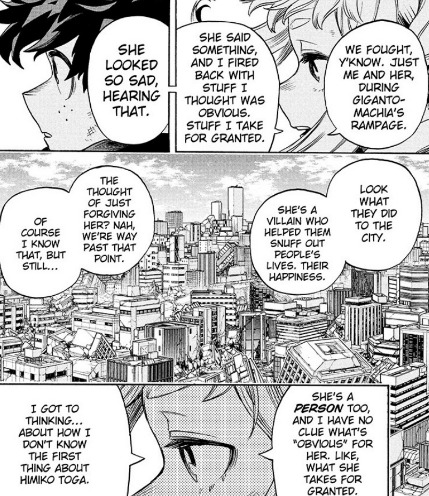
In fact Uraraka is actively trying to dehumanize Toga by looking at the destroyed city, so she won't have to think of Togaas a person.
The language here is also a major fault of this arc. It focuses far too hard on “forgiveness” over and over again. As I said before, saving Shigaraki isn’t about Shigaraki at all, it’s about Deku, and how he wants to use his power as a hero. Deku has even stated himself that he doesn’t believe that OFA is a power that should be used for killing people. So why does whether Toga or Shigaraki are forgivable or not even matter? It’s the same with Deku refusing Overhaul any sympathy. If he’s so morally opposed to abusers, then why does he work with Endeavor and defend him at every visible opportunity, even in front of his victims? Whether or not Deku can forgive Shigaraki doesn’t matter, because Deku is not the moral arbitrator or right and wrong. In fact Deku doesn’t even have any morals, so how is this a moral debate? Is there any point where Deku gives a clear definition of what he thinks right and wrong is? Does he quot Immanuel Kant to the audience?
Batman doesn’t kill people, not because he thinks that every last person on earth can be saved, but because Bruce Wayne an incredibly rich white man thinks that maybe he shouldn’t have the authority to decide who lives and who dies. When Bruce doesn’t kill the joker, it doesn’t mean he thinks the Jokers actions are forgivable, it’s because Bruce thinks it’s not his place to determine whether someone has the right to live.
The whole conflict that MHA presents us is that heroes pick and choose who to save, and only save the ones they deem as innocent. So, how does Deku saying repeatedly they can’t forgive Shigaraki contribute to that theme in any way? In fact by focusing on forgiveness, rather than whether or not he personally has the right to pick and choose who lives and who dies Deku is ignoring the elephant in the room. The question isn’t about whether Shigaraki’s redeemable or if his deeds should ever be forgiven. The question is whether Deku has the right to decide who gets saved and who doesn’t.
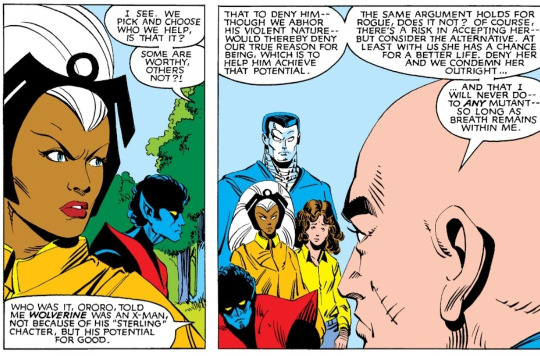
We are told that Deku as a character is someone who wants to save everyone no matter what, so Deku shouldn’t be focusing on whether or not Shigaraki is worthy of forgiveness, he should be making an idealistic argument like Xavier does in this panel. Why doesn’t Deku talk out loud with Uraraka on how he believes his power is for saving others, and not killing? If he’s meant to represent some idealistic hero, then why doesn’t he even talk about his ideals? Why don’t I as the reader know what those ideals are?
I think Xavier’s ideals of forcing the X-men to provide a good example to the mutant community, in order to try to earn the respect of other human beings is wrong, but at least he has ideals. He tries to inspire the other people around him to live up to those ideals. The story can criticize him for his ideals and point out how they’re wrong, while it can also uplift parts of his idelogy like where he believes there are no evil mutants. Deku has a chance to do the same to Uraraka, to tell her clearly, “I don’t think we as heroes have the right to pick and choose who we help…?” but he waffles. Not only does he waffle, but this moment is meant to be read as an indication that both Deku and Uraraka are sympathetic individuals who want to save their villains. They are supposed to look good and idealistic here and they don’t. For Deku it just seems like a repeat of his behavior with Overhaul. The only villains that are worthy of sympathy, are the ones that he personally decides are forgivable.
The story isn’t about whether or not it’s moral to save someone who’s killed as many as Shigaraki has. The story never seriously discusses any sort of complex morality or moral philosophy. Once again to bring up avatar, yes you can argue Aang sparing the life of a war crimminal is bad, but Aang mentions on multiple occasions that he wants to retain the cultural values of the airbending people. Aang has a morality, a consistent morality, it might not be a morality you personally agree with but at least he has one. Deku hates abusers, unless he’s next to Endeavor then he thinks abusers should be given the chance to atone. Deku doesn’t believe that One for All is a power for killing, but he never stands up to any of the adults who are blatantly trying to kill Shigaraki, he doesn’t even express out loud to Uraraka that he doesn’t think heroes have the right to decide who lives and who dies. In fact he’s given the perfect opportunity to, when Hawks kills a villain and it’s broadcast live on the news in font of everyone, but Deku never has anything to say about that. The reason Deku and Uraraka both put such an emphasis on “forgiving” their villains has nothing to do with the story itself. It’s because the author Horikoshi, is afraid that some people will misinterpret his story as saying that he actually thinks that saving a villain like Shigaraki means that he condones mass murder, so he has to have the characters talk about not forgiving Shigaraki.
Judai doesn’t have any consistent morals either, but once again that’s the point and something the story relentlessly calls him out on.
Cobra: Fortune would never smile on a fool like you who fights while prattling on about enjoying duels. Cobra: You are certainly a talented duelist. But you have one fatal flaw. Judai: A fatal flaw? Cobra: Yes, your duels are superficial. Someone who fights with nothing on his shoulders, cannot recover once he loses his enjoyment. What a duelist carries on his shoulders will become the power that supports him when he's up against the wall! Cobra: But you have nothing like that! Those who go through life without anything like that cannot possibly seize victory. Cobra: But I know that nothing I say will resonate with you... because you have nothing to lose but the match. Judai: I... Cobra: Afraid aren't you? Right now, you have nothing to support you.
Judai’s regularly called out for his superficiality. Judai is only a hero because he’s strong and wins fight, he doesn’t feel any responsibility towards other people, and in fact he loathes having to feel responsible for others. Judai isn’t just naive, he deliberately chooses to remain ignorant. Since he’s ignorant of his own faults, he makes awful decisions when it comes time for him to lead, and his friends die because of choices he made. We are told that Deku doesn’t want to remain ignorant, that he wants to understand villains, but Deku’s actual actions are him continuing to ignore society’s ills and the suffering of victims. In fact if you take away Deku’s internal monologue and the narration, Deku’s actions almost exactly mirror Judai’s.
Deku is just as superficial as Judai, and he also doesn't want to spend any time thinking about what kind of hero he wants to be, but the narrative never punishes him for it.
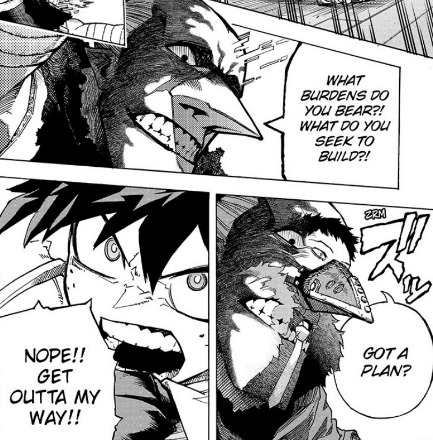
Judai is asked what burdens he has to bear and he has to meaningfull answer that question, Deku is allowed to get away with not having to think about anything. Deku remains superficial. Both Judai and Deku spend the entire arc running away from their villain rather than confronting them in any meaningful way. They both never express out loud any sympathy for their villain, or try to empathize. THey both never step down from the role of hero, and only confront their villain as a hero, because they don’t want to think about themselves as complicit or in the wrong. Shigaraki and Deku’s final confrontation mirrors Judai and Yubel’s but without the same clear framing. THe entire time Yubel is trying to get Judai to empathize with them, and Judai only responds with physical violence, because they don’t want to stop being the hero and because they can’t see Yubel as anything other than the villain. As soon as Deku arrives on the battlefield (by the way everyone else and their mom pointed this out, but Deku who doesn’t think OFA is a power for killing, is completely okay with a plan called the “Sky coffin plan” where every other hero was clearly trying to murder Shigaraki).
When Deku arrives he asks if Shigaraki is still in there, but he doesn’t do anything to try to reach Shigaraki, he jumps right to punching him. In fact he never tries anything besides punching him as hard as possible. How is punching Shigaraki with the force of a thousand suns saving him exactly? How is that different from how he tried to defeat Shigaraki the last war arc, before he saw the image of the crying child that made him want to try a different approach in saving Shigaraki? In Judai’s final fight with Yubel, it’s made explicitly clear that Judai is not trying to save Yubel, and that’s a fault on his part. In fact Judai gives the traditional “I have friends, and you don’t” speech to Yubel but it’s a subversion of how that speech is usually used. Usually that speech is used to show that the protagonist won because of they valued friendship,while the villain treated their friends poorly and only cared about power. However, it’s ironic in this case because Judai got all of his friends killed. Judai treats his friends like garbage. This speech isn’t used to show that Judai is winning because he values his friends more than Yubel does, it shows that Judai is a hypocrite, playing the hero in this situation where they are just as bad as Yubel. Judai’s not morally superior, he’s just lucky that he has good friends. Friends that were willing to save him. The only connection Yubel has to anyone else, Yubel’s only friend is Judai and Judai is a shit friend.
In fact, Mirio tries to give a version of the “You don’t have any friends” speech to Shigarkai, only for Shigaraki to get mad and tell Mirio that he does have friends and people he wants to protect.
This fact is also something that is blatantly ignored by Deku, even though Mirio tells him about it… even though we are told that Deku is trying his best to see the humanity in Shigaraki.
Judai blatantly admits they’re trying to kill Yubel. Which makes them a worse person, but a better character than Deku, because their actions are clearly framed by the narrative and consistent.
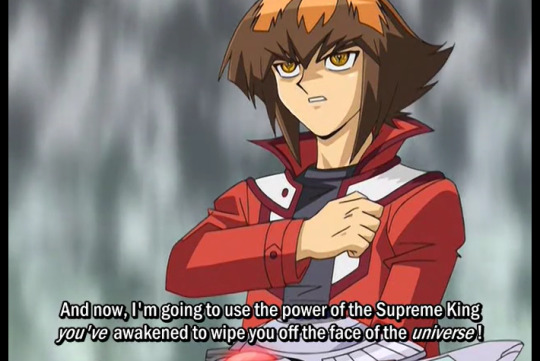
On the other hand we are told that Deku doesn’t want to kill Shigaraki, and yet everything Deku does makes it look like he’s just trying to kill Shigaraki and put him out of its misery. If we didn’t have Deku stating out loud that he wants to save Shigaraki and wants to see him as a human, there’d be nothing in his actions to indicate that he’s trying to avoid killing Shigaraki. Deku says he can’t pretend he didn’t see Shigaraki crying, but like, does he ever hesitate to punch Shigaraki, does he ever think that causing Shigaraki more harm is wrong when he’s already suffered so much? Deku says that Shigaraki is a person but does he treat him like a person? Does he try to talk to him like a person? To use avatar again, Aang does talk to Zuko pretty early on. Deku doesn’t even give the classic “We could have been friends under different circumstances” speech. When Shigaraki resists Deku’s attempts to see him as a person or emapthize with him, Deku’s response is to just resort to punching harder.
Which is in effect the same thing Judai does to Yubel, just kill them as a villain so they don’t hurt anybody else, but framed in an entirely different light. Judai is shown to be ruthless, and cold in his attempt to only settle the conflict with Yubel by violently putting them down. On the other hand we’re being told that Deku is compassionate and empathic while he punches Shigaraki with the force of a thousand suns.
There’s another eerie similarity between both of these final confrontations. At the climax of the confrontation, both Judai and Deku have a psychic vision where they see events from Yubel and Shigaraki’s childhood. This vision is supposed to help both characters understand the good in the villain they’re facing.
Let’s see the contents of this vision and how the visions change each character. Judai is shown a vision of his past life where Yubel sacrifices their entire body, and even their humanity to go through painful surgery to turn into an ugly dragon, all for the sake of protecting Judai in a previous life.
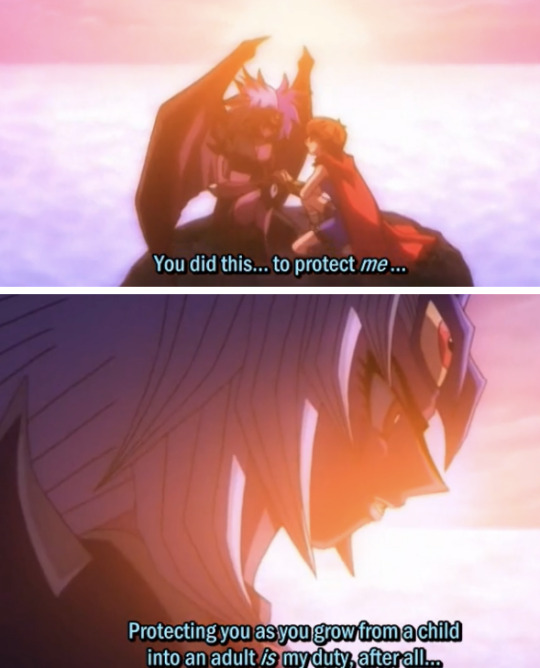
Judai is then forced to witness the good side of Yubel they’ve been ignoring all along to paint them as a villain. Yubel is simultaneously extremely selfish and willing to hurt people Judai cares about, but they’re also extremely selfless and will do anything to protect Judai and have made great sacrifices in the past for Judai’s sake. Deku gives lip service to not ignoring the humanity in Shigaraki, but Judai is literally forced to acknowledge the humanity in Yubel. Not only that, but Judai changes his behavior immediately after learning this new information. After seing the sacrifice that Yubel made for him in the past, Judai responds with a sacrifice of his own. A sacrifice that perfectly mirrors the sacrifice that Yubel once made for him. Yubel gave up their humanity for Judai, so Judai fuses his spirit to Yubel’s, becoming a human / spirit hybrid so Yubel no longer has to be alone.
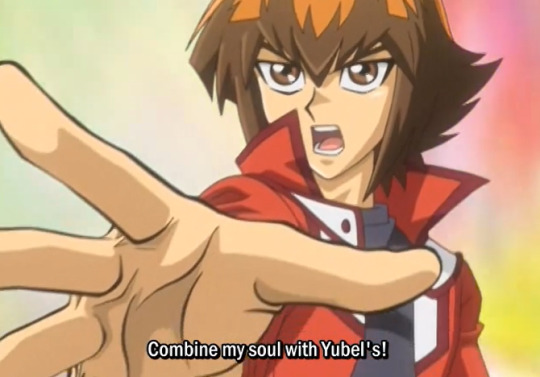
Judai also doesn’t just fuse their soul with Yubel’s in order to stop Yubel from destroying everything, it’s because both of them at this point need to atone together, and Judai is fulfilling his responsibility of watching over his friend until the end to prove that you care about them - as he said to Sho. Judai’s also fulfilling Johan’s dream of helping repair the bonds between spirits and humans, by reconciling with Yubel and repairing their bond. It’s also Judai atoning for his previous behavior of abandoning Yubel, by choosing to stay alongside them as they both atone together. Deku does sacrifice OFA during the fight against Shigaraki, but their sacrifice isn’t to help Shigaraki, but rather doing psychic damage to Shigaraki by using OFA is the only way to defeat them. He transfers OFA in order to break Shigaraki’s brain so he’ll stop reissting and Deku can beat him down. Judai fuses their soul together with Yubel out of empathy and a responsibility they feel to help their friend fater abandoning them, Deku transfers One for All to Shigaraki in order to hurt him and make him easier to punch. It's funny that Deku doesn't travel to Shigaraki's mind to learn more about him, but instead with the specific intent of harming him.
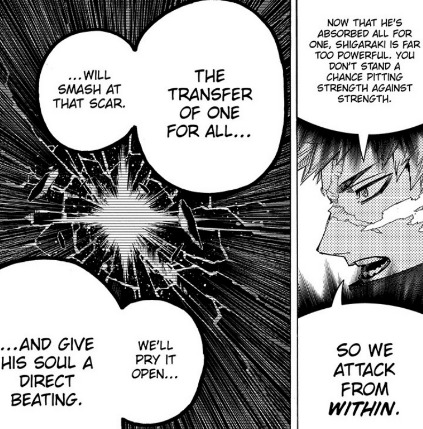
Once he's inside Shigaraki's mind, he doesn't take time to reflect on how Shigaraki used to stand up for bullied kids, or how he wants to be a hero to villains because no one else will stick up for the outcasts in society. No, he only care about Shigaraki when he takes the form of a child crying for help.
In the aftermath of the psychic vision Deku’s behavior doesn’t change towards Shigaraki in any way either. You could say he sacrificed his own arms in order to try to comfort Shigaraki within the depths of his own mind - but that’s not a real sacrifice either because his arms immediately come back. When Judai learns about the sacrifice that Yubel made in a previous life towards him, he stops seeing Yubel as an enemy and finds a way to resolve things peacefully between them. When Deku lanterns that Shigaraki’s a victim of All for One, and that his entire life was a lie, when he sees Shigaraki’s suffering first hand does his beavior twoards Shigaraki change in any way?
When he sees Afo has taken over Shigaraki’s body again, does he try to shout for Shigaraki, to tell Shigaraki to fight from the inside, to reassure Shigaraki that he’s still in there that there’s still good in him? Nope. He just punches Shigaraki some more.
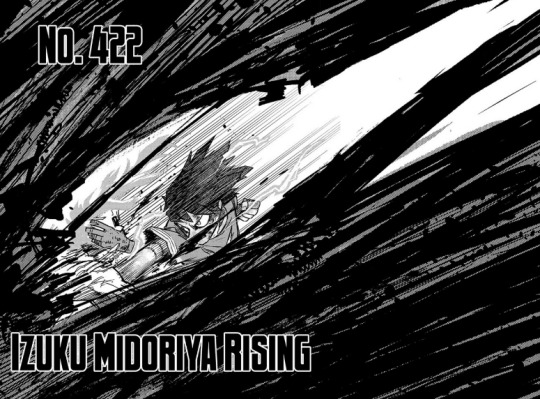
What Deku needed to tell Shigaraki is so obviously set up by the narrative too. Shigaraki wanted just one person in that house to tell him he could be a hero. Deku wanted his mother to tell him he could be a hero if he was quirkless. Deku sees that Shigaraki started out as a boy who wanted to be a hero, and who was manipulated into being a villain but does he try to appeal to the boy inside of Shigaraki by telling him he can still be a hero? Does he now see the good in Shigaraki? Nope, he just tries to kill him by punching him really hard.
I purposefully chose the images for the banner of this post, because it shows how differently MHA and GX treated its villains in the end. Yubel is embraced by Judai in the end, Shigaraki evaporates into dust.
"Judai, now that our souls have become one we will never be separated again. I have now been filled with your love and power. Let us fight together, against the wave of light leading this universe to destruction!"
Shigaraki could so easily have been given the love and empathy that Yubel was shown, but instead their life ends with no show of empathy from Deku, and with them dying believing that their long life of tragedy meant nothing in the end. Shigaraki realizes he's a crying kid, but he's never comforted.
Shigaraki: I only stole my body back from Master, and I didn't destroy anything. "In the end, I was just as you said... A crying kid, huh?"
Yubel is embraced and comforted, Shigaraki disintegrates into nothing.
One of these stories is apparently an optimistic story about heroes saving people, but it ends with the lifelong victim being killed in the most nihilistic manner possible, never receiving comfort, and never achieving anything with his long life.
The other story is a silly anime about card games, shows that when people are alone and suffering they can lash out and do terrible things. That all people are weak especially when they're alone, but the solution isn't to abandon them, or condemn them for their faults, but to believe in them and help uplift them the same way that Judai decides to uplift Yubel so they can atone together.
Which is why Deku gets an F in being a hero. Go directly to summer school. Do not pass Go. Do not collect $100.
#mha meta#ygo meta#mha 423#bnha 423#mha 423 spoilers#bnha 423 spoilers#izuku midoriya#deku#shigaraki tomura#tenko shimura#judai yuki#yubel#soulshipping#yu gi oh gx#yu gi oh
741 notes
·
View notes
Text
So, Gushing Over Magical Girls Is The Best Thing To Happen to Magical Girls

Gushing Over Magical Girls get this bad rep. For all the wrong reasons. I’ve seen it be called an insult to Magical Girls, I’ve seen it be called “gooner bait” a term I absolutely despise but that’s a thing for another day. I’ve seen it insulted for everything and anything under the sun.
I first got acquainted with it when I was scrolling through Twitter and I saw someone complain about the PV. However, as an avid Magical Girl Fan, I wasn’t disgusted. I was intrigued.
I decided to read the manga, and oh god.
This is one of the best things I’ve read.
The story follows Utena, a shy girl that loves Magical Girls, tricked to become the evil general that will defeat the Magical Girl team “Tres Magia”.
And it’s a delight.
I binged all the episodes available to me in the manga, and had fun in each and every chapter.
The same, however, couldn’t be said by half the people who watched the anime. And I was extremely baffled. As a queer woman, this was the first time in my life, in which I had seen something so deliberately catered towards me. I saw tell-tale signs of someone who genuinely admires the genre, and is simply using it as an outlet for exploring deeper and more interesting topics that a SFW version of it would not be able to.
Yet, I turn around and I see people calling it the most horrendous stuff, and accusing everyone who likes it of being monsters or men.
Genuinely, I’ve had enough.
Gushing Over Magical Girl is not the Devil. In fact, I think it’s the best thing to come don’t even like Magical Girls AND IT SHOWS.
PART 1: “Magical girls are for little girls!”.
The first criticism you’ll see aimed at “Gushing over Magical girl” is the amount of sexually charged content it has. And it is true. It borders on straight up porn in many instances and it just gets wilder as you go on. By chapter 30, we’re way past PantyShots. Like, I’ve seen some of these girls’ vaginas, and I’m not joking.
Personally, I don’t see anything wrong with it, but there’s people who might disagree.
“Magical Girls are for little girls” some people say “and you’re corrupting it!”
Which genuinely makes me laugh.
This is because this type of argument could only be done by someone with no real concept of Magical Girls aside from maybe Sailor Moon and Sakura Card Captor.
out of the Magical Girl genre in a WHILE (Ignoring Precure, because they just gave us a magical boy and that’s my win of the decade).
People are just, you know, stupid. And reactionary. Enough that they see a boob and lose their minds like a Karen at a Christmas Eve Mall.
My point is, I love this manga. And I’m willing to risk my reputation to defend it. Cause genuinely, half the people who are clutching their pearls over this show - Magical Girl Anime haven’t always been PG, or aimed at girls.
Cutie Honey is a great example. It’s one of the most famous Magical Girl Anime you will find - and it’s a shonen. With the protagonist, Honey, being constantly naked, groped, put in suggestive situations and have outfits that show her cleavage.
And it’s one of the most famous, most popular takes on Magical Girl there is. Yet, I never see any amount of outrage towards it. (Part of me wonders if it’s because the fan service is aimed at men, rather than involving yuri).
There’s also Lyrical Nanoha, one of the most popular serial franchises there is. It spans several seasons and spinoffs, and it’s beloved by many.
And it’s aimed at older men. Yes, it’s a Seinen.
In fact, its origins are far from PG. It’s actually a Spin-off of an erotic game named “Triangle Heart”. It was most definitely not created with little girls in mind, and themes it tackles reflect as much.
There’s Fate/kaleid liner Prisma Illya too, a spinoff of the Fate/Stay Night VN, very obviously aimed at older men, it’s a Seinen. It has a lot of fanservice and scenes where the characters are half naked.
Day Break Illusion is also a Shonen.
And as much as I adora Madoka - I’ve been stating for years now that it isn’t a show meant for little girls. You could argue it’s for everyone, regardless of gender, who’s a little older. But it most definitely wasn’t for little girls.
So, no. This was never an “only girls” club. Trying to paint it as such, is not only wrong but ignorant.
Magical Girl shows can be for anyone. Men, boys, girls, women and I find it infantilizing to consider it “only for little girls”.
No one says “super heroes are ONLY for little boys”
Well, some do. But they’re, you know, bigots. Who don’t want girls playing or adults o have fun.
So no, Gushing Over Magical Girls being a sexually charged anime in the Seinen category isn’t “corrupting the genre”. In fact, I would argue it’s doing exactly what the genre has done in the OVA shadows for a while.
Not to mention, many people have screamed from the rooftop how they want “more mature Magical Girl shows” referring to the success of Madoka. But as soon as an actually mature take on Magical Girls shows up, tackling issues of sexuality and love, you all don’t want it anymore.
(We all know why, though. Americans, and western culture in general, considers mature themes, only that which involves violence. Anything close to discussing issues of sex is no longer “mature” but “Pornographic” and deserving of being shoved into a corner. With all queer themes, gender studies, and any nuance that could be had regarding these issues).
And speaking of sexually charged, have you watched so called “wholesome” magical girls? They’re still very much sexy. Not in the “on the nose” ecchi way Seinen and Shonen are - but they still are.
You’ll find transformations were the girls are naked, zoom in to their breasts, you’ll have panty shots every now and then. Even themes of growing up, having crushes, and innuendos about sex. Inappropriate relationships, taboo romance, and the likes.
Sakura had Rita and a professor’s relationship (mutual in the manga), Sailor Moon had Chibiusa and Elliot’s romance, Sugar Sugar Rune even having an element for ‘lust’ and other different types of love, and let’s not forget Mermaid Melody which has several instances of the girls naked, in compromising positions with other men. And I’m pretty sure Tokyo Mew Mew likely opened a whole bunch of doors for girls to be into CNC.
This is, by the way, normal.
Completely so.
These stories often talk about the girlhood experience. And girls and teenage girls are interested in all of these things. They’re interested in sex, romance, their bodies growing up, their own sexuality and the likes. It’s no wonder same-sex relationships and romance get included, they’re part of what experiencing the world through the eyes of a young girl is like.
And subsequently, it stands to reason that as people who engaged with MG grow up - they find comfort in exploring their sexuality through Magical Girl themselves. There’s a reason why there’s a growing section of “Magical Girl” in your local hentai site.
“Men get off on corrupting this wholesome girl targeted genre” is actually TERF rhetoric sneaking through the mainstream. It ignores AFAB ppl and gender nonconforming people, who grew up with Magical Girls, simply using a medium that originally started their journey of sexual identity, to explore more “grown up” aspects of that same identity.
In particular, I’m a Cis AroAce Woman. I wrote a lot of Magical Girl NSFW when I first started writing NSFW Twitter threads. They’re bad and they’re cringey. But it was something I needed.
Magical Girls were a huge part of my childhood and early teens. When I was mentally in the space to want to engage with NSFW content: it was obvious I would turn to what first sparked excitement.
So this idea that “men are corrupting Magical Girls with their sick fantasies” is nothing more than TERF-lite propaganda. People, including women and men, have been doing this for ages; for a variety of reasons. And doing so, doesn’t rob children of their spaces - but the gentrification of the internet is a story of another day.
The other argument I have heard is that GOMG is a mockery of the genre. Which is even more laughable in my opinion.
PART 2: Parodies and why I hate Earth Defender’s Club.
Gushing Over Magical Girls loves Magical Girls. It’s a parody, in a way, but it knows very well what it parodies. It’s not surface level in the slightest. And it absolutely is not mean spirited about it.
A lot of the time, shows that reference and parody the Magical Girl genre, do so in ways that feel like they view it as a lesser genre. They take generic images of cute girls in frilly outfits, swap the colors around, and have them chant over-the-top spells. You’re meant to laugh, not only at how silly they look, but people who would love it. Especially if they’re grown ups.
I do not like “Cute High Earth Defense Club LOVE!” For this exact reason - even tho many people praise it to all heavens.
Because
1) It feels surface level in its commentary and depiction of Magical Girls and
2) More mocking towards the genre than paying homage or doing anything with it.
The continuous use of the word “Love” is a very obvious jab at Magical Girls using these words, which feels mean spirited just for the sake of it. Their outfits are almost exactly the same, save for the colors. And they all use the same sticks as weapon, with no thematic link for the shapes of the scepters. The mascot too (a wombat for god knows what reason), I think it’s meant to be a joke of some sort for how ridiculous some of the mascots for the girls get, which rubs me the wrong way.
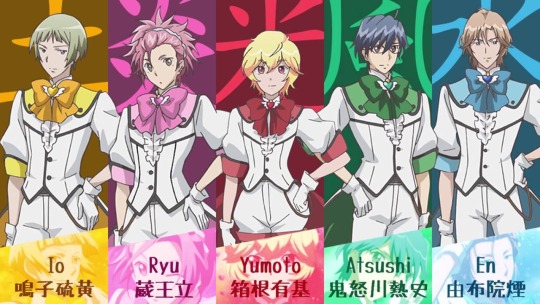
In general, it feels shallow and mean spirited. But no one calls this an insult to Magical Girls. Because people who like it don't actually care about Magical Girls. They see cute boys doing silly things and love it. Which is kinda sad.
Now, Gushing Over Magical girls has sort of that same problem on the Tres Magias…But they’re not the protagonists. And even then, in later chapters, they get power ups that are different in design, and thematically linked.
The protagonist, and the ones we follow, are Utena and the girls. And they all have very distinct outfits, all with motifs that are tangentially thematically linked, and speak of each character’s personalities in interesting ways.
Utena in particular has THIS outfit. Which a lot of people don’t like, but I actually do.
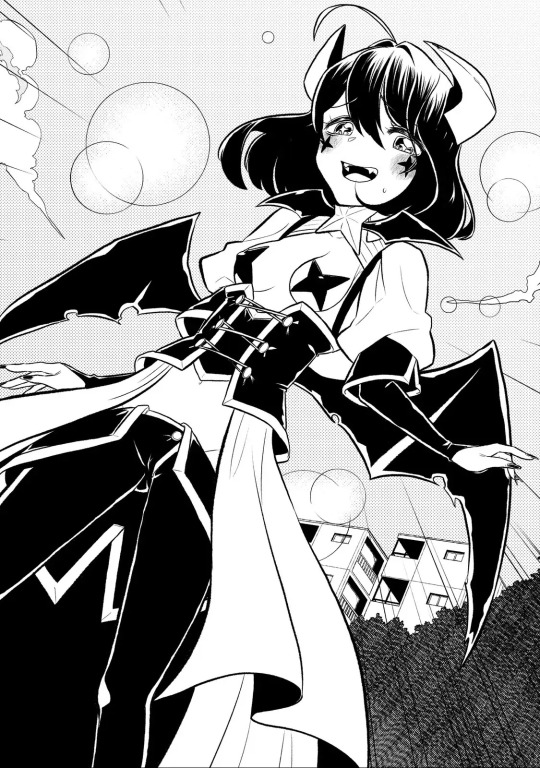
It’s very obvious it’s taking inspo from other iconic Bad Girls in the genre. Namely, Utau, Kraehe and Devil Homura. All “Enemy characters” that have unhealthy obsessions with other characters. In particular, I think the wings and the feathers resemble Homura - THE character known to have a massive obsession with a Magical Girl (Madoka), to the point of insanity.
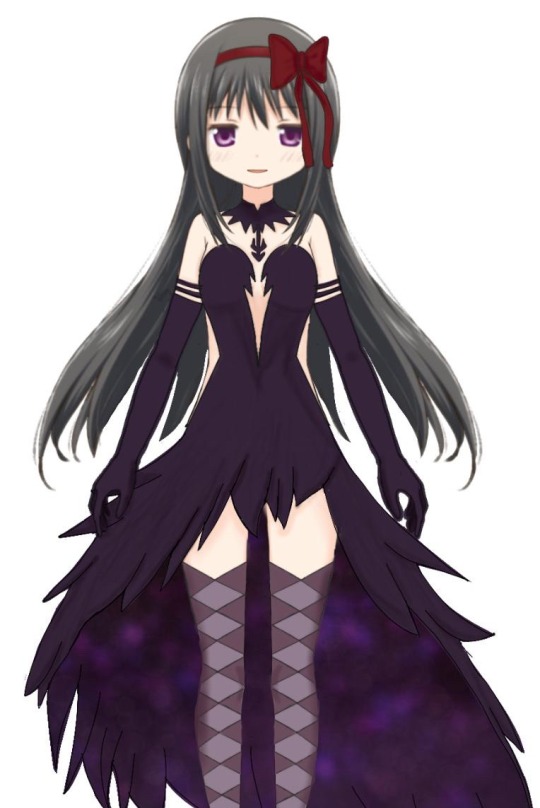
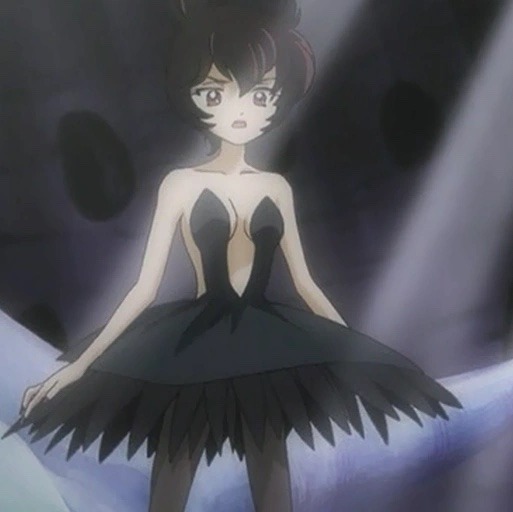
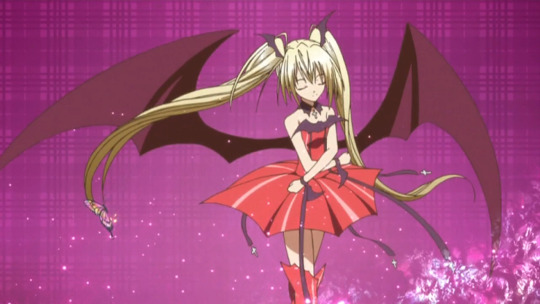
There’s also Magia Azure. Who’s a clear reference to the Mean Tsundere girl that is iconic to the genre. She’s also a Miko. Which is a callback to Sailor Mars, arguably THE girl who popularized this archetype.
I also love what they do with the mascots. Unlike Earth Defenders, where the mascot is you know, a mockery of the archetype of a mascot - useless, only there to give power ups, and obsessed with food - the mascots of GOMG is taking a book from Madoka.
It considers the mascots both all-too-powerful and yet limited in their reach. Which is exactly what the mascots have always been in Magical Girls. Beings so powerful they can give mythical powers to girls, yet helpless to do anything on their own. So, they use magical girls as a vehicle to achieve their goals. Most Magical girls try to paint this as a good thing, but newer genres shine light on how dangerous that can be too.
Madoka tackles it with Kyubey as the main initial mascot, only later to turn out to be the villain of the series.
And in a Post-Madoka world, trusting the mascots is just the slightest bit more difficult. That’s why, from the get go, GOMG portrays their mascots as morally corrupt. He’s not a good character, he’s malicious and doing more harm than good. But for the majority of the series, he’s painted more as a useless harmless evil than anything genuinely terrifying or worthy of concern. The attention is focused on other things.
But I love the way that it’s heavily implied that they’re not good. It’s a very interesting take on the mascot and it helps with the themes of the series. Which yes, by the way. Gushing Over Magical Girls has themes.
Which lead me to-
Part 3: Yeah, uhm, Gushing Over Magical Girl has themes.
There’s this idea that Sex is an inherently violent act. In which a man humiliates and sodomizes a woman, and therefore the woman is exploited in some way. And 10x worse is any act that involves BDSM. It’s violence; born out of hatred.
This is TERF rhetoric. I’m not joking. This line of thought leads directly to TERF ideas.
Many on the internet have pointed out as much, and BDSM members have gone to be very vocal about it. In particular, people on the role of the submissive (or the bottoms) are loudly trying to explain the contrary. How they like the act of sex, like the idea of being vulnerable, or being humiliated. There’s also plenty of LGBT+ stories that talk about it, both in western and eastern spaces. Just jump into the section of dom/sub verse at your local manga browsing website, and you’ll find something.
That said, the same is not as common for people who like to “dominate”.
I can only think of two pieces of media that argue that, whoever is the dominant or the sadist, is also a human being. That whatever they’re doing is done, not out of hatred for the submissive or an act of violence, but love.
One, is the husky and the white cat. In which Mo Ran, among other things, has to come to terms that his love isn’t “pure”. That he cannot love someone without the want to have sex, and to completely dominate that someone.
The second one is Gushing Over Magical Girls.
It’s very clear to me that Utena’s sadism isn’t a violent act. It’s an act born out of love. She genuinely loves the Magical Girls, and most girls for that matter, and whenever she is inflicting pain and fighting with them - what she wants is to ultimately help them in some way.
She wants them to “be the cutest version they can be” and wants them to shine brighter than ever.
There’s this one scene I love, around chapter 20, in which Baiser (Utena) is fighting Magia Azura. And due to Baiser going a bit too far, Azura ends up being Mind-broken. She crawls towards her, calls her “mistress” and begs to become her servant.
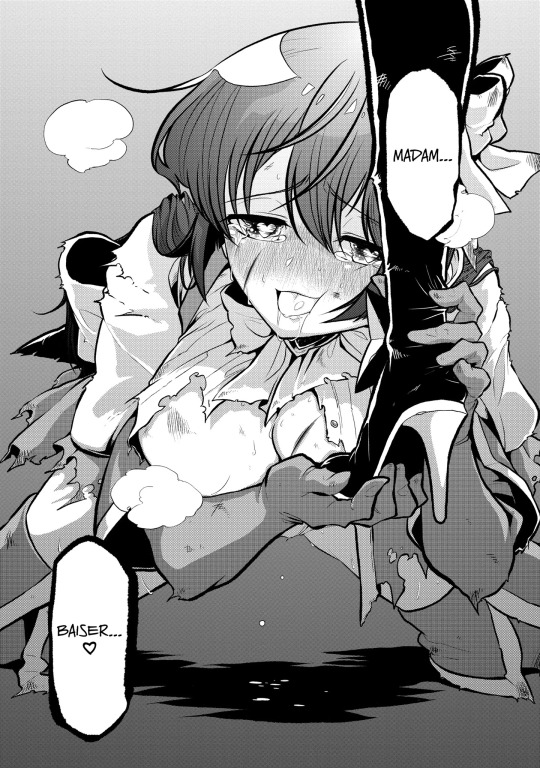
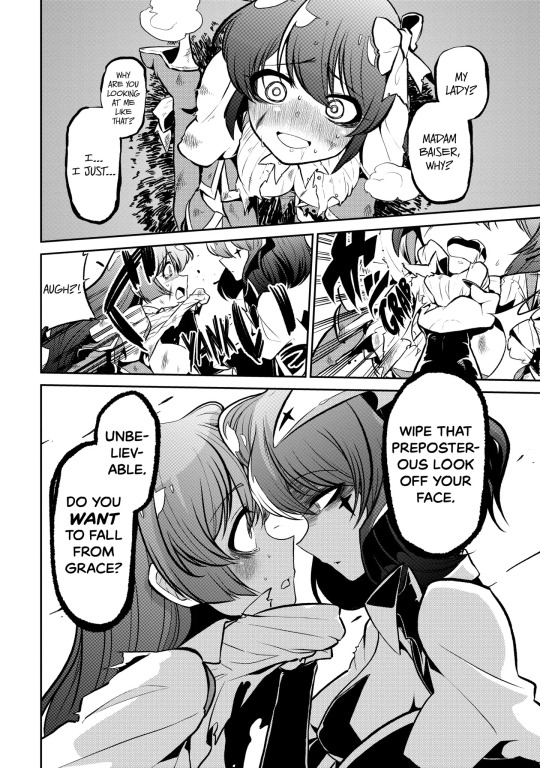
In any normal Hentai you’ll find, this is a good thing. This would be the ideal outcome. A character being turned into nothing but a sex slave for the enjoyment of the dominant.
Which is why I found it breathtaking when that didn’t happen.
Baiser is horrified by this. She does not want to break the girls, she wants them to be powerful. She wants them to win. With her, the evil one, being nothing more than a vehicle for them to be even stronger than before.
This is the first time I’ve ever seen dominant or sadist characters being presented both sexually, and in such a positive light. Much less a queer woman in the same position.
It doesn’t treat BDSM sex as a disgusting taboo act, but something born out of genuine love - and a want to see the other person be or feel better.
This is reinforced around chapter 25 where Leberblume and Loco Mùsica are fighting Baiser. For context, Loco Musica wanted to be an Idol, but had terrible singing. She uses her evil power to basically force everyone to listen to her sing (which is so reminiscent of Mermaid Melody btw). When they fight, Baiser wins, and is then set to use her new found power to “punish” Loco Musica.
Originally, Loco Musica points out how Baiser’s sadistic tendencies are “the same” as Lord Enorme, who we’ve seen uses sadism as a genuine form of punishment. Something to avoid. You behave well, because you don’t want to get hurt or humiliated by her.
However, when Baiser uses her own unique type of sadism on Loco Musica, something happens. Instead of causing her physical pain by beating her or using violence, she forces her to get naked and perform her idol song like that. This causes her to get extremely embarrassed. And in the process, she actually starts to sing really well.
This is important for two reasons
1) Baiser is actually taking into account who Musica is. It’s later revealed that Musica wanted a more frilly idol-like outfit but Lord Enorme shut it down, for the sake of a more ‘unified’ aesthetic. Baiser is not just throwing around the same treatment and punishment for all girls - what one might like, the other might hate.
2) At the end of the day, while she did the punishment, it was both embarrassing, but ultimately something that helped Musica and made her feel better.
And that’s really the key here, and why I love the series.
Sadism, sex and kinks in general are not tools of degeneracy. They’re treated as part of our experience.
Also, it’s just fun?
Part 4: Gushing Over Magical Girls is just extremely fun when you don’t have a dumb bitch yapping abt how unholy it is to see tiddies on a screen
Yeah, GOMG just has one of the most creative depictions of the most insane of kinks you’ll see - I could spent hour gushing over Nero Alice.
Seeing all these different kinks being depicted as powers and abilities that these characters have - and seeing how they interact with other people is just interesting.
The sex scenes are both hilarious and kinda sexy. Specially if you do like to see women all hot and bothered. Personally I’m not into girls (or anyone for that matter) but I have to admit the scenes were pretty hot. And there is no shame in admitting as much. No matter what the puritanical Christian on Twitter crying abt “god honoring lesbian sex” Will tell you.
I cannot begin to explain just how hype and relatable it was to see Magia Baiser defeat Lord Enorme with the power of straight up delusion, we STAN.
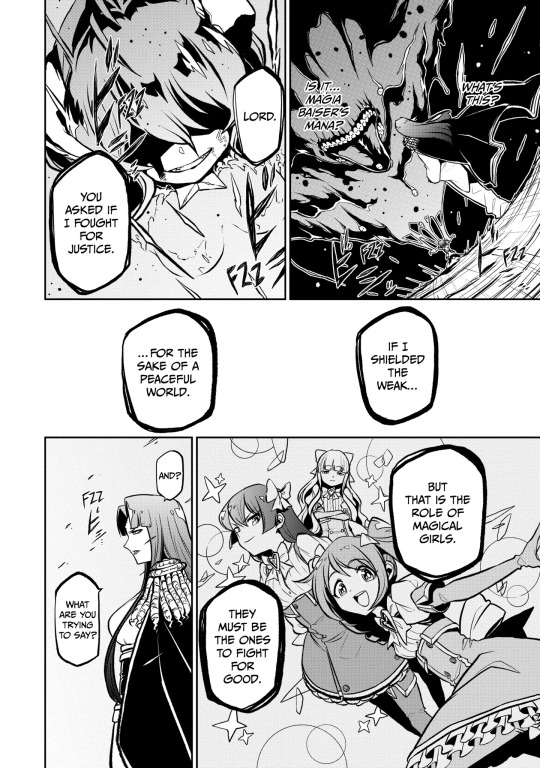
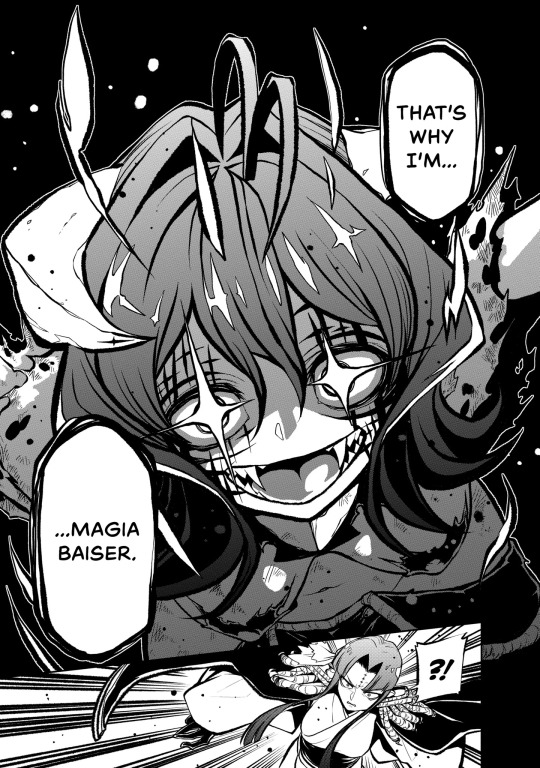
So, yeah.
It’s been a while since I last saw a Magical Girl Show so unashamed of being a Magical Girl Show. Unashamed of being weird, of praising the genre and just enjoying it.
My essay is titled, in part, as a joking reference to my much more popular series “MLB is the worst thing to happen to the magical girl series”. Which I still think is true.
And while, yeah, maybe GOMG isn’t the best thing to come out of the genre…I still think it’s good that it came out.
A lot of people say they want a more “mature” take on Magical Girls but - this proved to me that just isn’t the case.
Gushing over magical girls proves that the Magical Girl Genre Can Be so much more than what people think. More than glitter and sparkles, more than vapid action scenes, or what little girls want.
Much like any other genre, it can be raunchy, it can be messy, it can explore things outside of the status quo. But it can still deeply respect the source material, and the origins of it.
GOMG proves Magical Girls can be fun. Just. Straight up fun. Regardless of your age. They can serve and connect you to parts of yourself you didn’t realize you could connect to.
I hope it proves to more people that the genre can be so much more than “just for little girls” that parodies can be more than pointing and laughing, and that it can have themes beyond just, “friendship”.
Magical Girls can be so much more. You just, have to have an open mind about it.
#gushing over magical girls#2k magical girl essay#cute high earth defense club love#sailor moon#puella magi madoka magica#shugo chara#I will defend this show with my life it’s genuinely so much fun#yes I am willing to tank my reputation for it it’s so fucking funny 😭😭
269 notes
·
View notes
Text
Self aware! Lighter who feels something watching him...the same presence he felt in the underground once except this time it's stronger and it lasts longer.
Self aware! Lighter who starts questioning his existence when he learns he's in a video game. Was his mercenary friends dying all just for someone's mere entertainment? Was all the debt he racked up for his mercenary friends families just for a compelling story narrative? Could he have saved his mercenary friends that day or even joined them during their deaths? He's never felt so powerless and defeated even though he is the undefeated champion of the Sons Of Calydon.
Self aware! Lighter who is at a loss of whether or not his life is really his anymore or mere entertainment for whoever is watching their lives play out in this game...but then again maybe you're not at fault after all maybe you weren't the maker of this game and maybe you aren't to blame right?
Self aware! Lighter who tries to get used to living his life as usual and pretending that being a video game character isn't such a big impact on his life after all. That his whole life is a lie. He can't think that after all the Sons Of Calydon still need him so he needs to stay strong for them. He won't be defeated no not now.
Self aware! Lighter who doesn't know how to feel about the proxy who's helping him. He gets it that whoever is watching them somewhat inhabiting the proxies mind but he realizes most of the things the proxy does is on their own accord and not because of this entity watching them which is odd? But then again it might be a video game mechanic and after all as observant Lighter is he notices in some instances where the proxies actions might not be their own. For example they stare too long at him? Odd but he could pass it off as a coincidence or could he? After all he was rather sure he heard a faint voice of gushing about him he would have missed it if the winds were too strong but luckily today they weren't.
Self aware! Lighter who hears a voice feels sorry about him when he reveals his pass slowly to the proxy? Is this voice you? The one whose presence everyone felt? The one who's playing this video game? Lighter doesn't need your pity after all he was just a video game character just entertainment to you but the way you react makes him think twice about such a thought after all you were still human and you didn't seem to realize he's conscious in this game
Self aware! Lighter who feels a little embarrassed when you gush about him when he feels shy when being called handsome? Sure he could pass it off as the proxy is joking and surely you're right? And no he doesn't look cute when embarrassed right plus he's not embarrassed it's just well even he isn't sure how to word it. But it's kind of cute how you gush about him and his antics.
Self aware! Lighter who picks up on topics from your world whenever you ramble while playing the game. Oh? A new season of a show you like is coming out well good for you. Oh? Something bad happened to you today, well he's not sure if he can help much but if letting it out makes you feel better might as well. Lighter as observant as he is he makes sure to not miss any details whenever he hears you speak while playing after all it's in such moments when no one's around that some people will talk about their lowest and highest points in life and he's glad to hear from you after all it feels like some connection not that you know of...
Self aware! Lighter who can't help but feels a little bad for you whenever you use him in combat and one of his teammates accidentally dies. It's not like he can help when he's programmed with a voice line to say that...he feels bad that you feel guilty for making him experience another loss again even though they'll respawn he still feels bad for making you feel that way when hearing his voice line even if it's somewhat your fault..
Self aware! Lighter who feels a little closer to you as time goes on especially if you pulled for him and got him. Even if you didn't manage to get him in time he'll guarantee that he'll try to come home to you in his what's that called? Rerun. Yeah that.
Self aware! Lighter who feels a warm feeling in his heart when you wish him happy birthday. I mean sure the Sons Of Calydon and the Proxies had wished him a happy birthday as well but from you he wasn't sure why it was different...and if you go as far as to draw or make something for him for his birthday or even celebrate by buying cake well now that feeling just got even warmer something akin to butterflies in his stomach or whatever that saying is. It's kind of silly seeing you who he doesn't even know how you look like wishing him a happy birthday and even celebrating for him. Maybe one day he could do the same for you and maybe he'd actually get to see you one day...
Self aware! Lighter who one day wishes to take you on his bike not as the proxy or Eous just you in the flesh to see the sunset with him..after all you're just as warm as the sun...

Thank you so much for reading this and once again Happy Birthday Lighter! I wrote this while watching Link Click Bridon arc so I apologize if the writing was a little glum for this as sure it's just the first episode but I'm already sobbing. Anyways I hope you enjoyed this and I apologize if Lighter sounds OOC. And also I'm trying to experiment with my writing style as of now. Thank you for reading and any constructive criticism or feedback is appreciated!
180 notes
·
View notes
Text
Byler + Closet Imagery
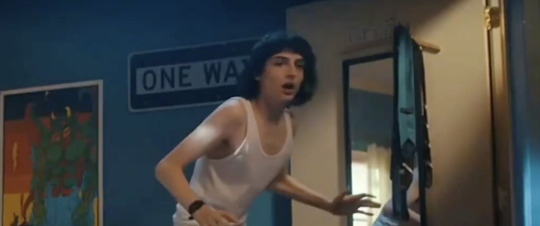
Just wanted to show just how much closet imagery and references there are in stranger things and how it's super obvious, that it's kind of insane that it goes over the GA's heads so much. It's mostly with Mike as well, funnily enough.
Closet imagery has been used in media over the years to show that a character might be gay but the audience/the other characters just don't know it yet.
For example, it was used here in Paper Girls (2022) for KJ who was not out as gay yet.

It was also used for Eyewitness (2016) with Lukas who also has internalised homophobia and we already know that Byler has had a parallel to Eyewitness before.
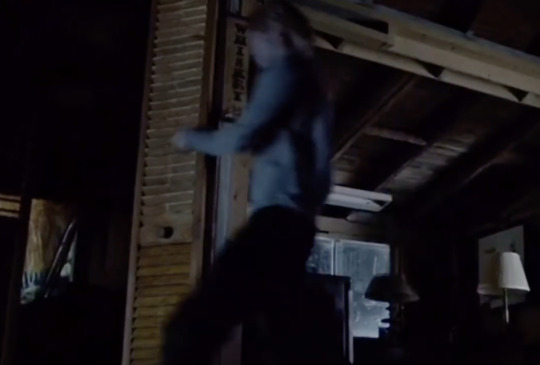
So, it's interesting that this closet imagery has been used for Mike and Byler ever since the show began in Season 1. Let's look at all the ways it has been used and how insane these are that some people deny them because UHHHH....
1. Mike hides El in his closet

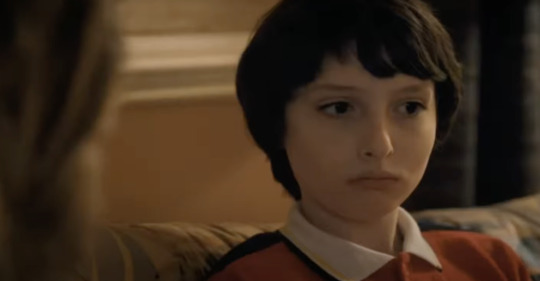
Karen: "With all this that's been going on, with Will, I can't imagine what it's been like for you... i just-- want you to feel like you can talk to me. i never want you to feel like you have to hide anything from me. i'm here for you. okay?"
Mike: *is hiding El in the closet* *a noise comes from the closet after Karen says these things* *he lies about it* *Karen then hugs Mike later on when Will 'dies' HADGSJHDG*
2. Argues with El in a closet
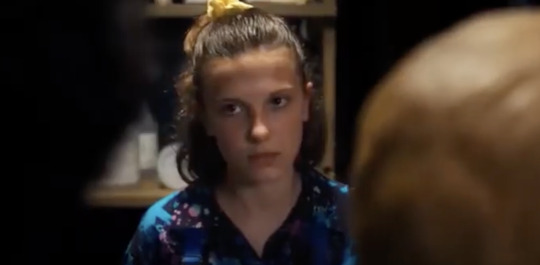
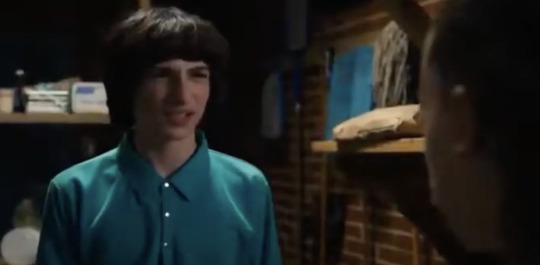
I find it so funny how the framing here is El literally between Mike and some male dummy and then she grabs it from him LMAOO i love cinematography.
Mike: 'You are the most important thing to me in the worl-'
El: *interrupts him* 'What if [Hopper's] right?'
Mike: *feels attacked as she questions the legitimacy of their relationship while she holds a male dummy in the closet* "No, no no no. He's just some angry old man who hates joy."
Why are you questioning the sanity of someone instead of using actual arguments for your relationship?? Oh that's right, you're in the closet <3
3. Kisses El in front of a closet
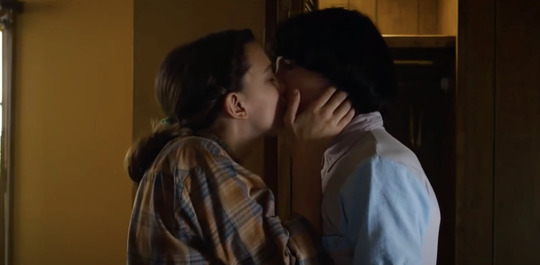
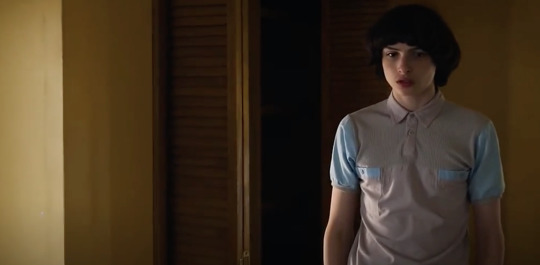
Particularly, this is Will's closet as well.
El: "I love you too" *kisses Mike*
Mike: *makes disgusted/ confused face* *doesn't kiss back and has his eyes open* *has the light coming from the closet framed on his head as if he's realised something.*
El: *walks away smiling*
Mike: *looks to the side confused with an open closet next to him* *thinks What is wrong with me?/ What just happened here? (original script)*
Also the music is "The First I love You" which is the same music they use in a scene where Robin comes out of the closet.
4. Mike reads a letter from El in front of a lit up closet

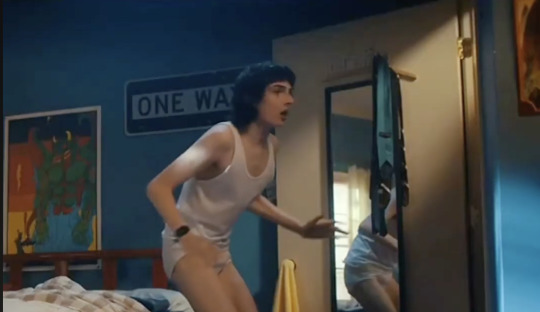
Bro is reading a note with RAINBOWS ON IT and then the camera pans to him reading with a literal open closet which is lit up right next to him. How is this not blatant queer-coding??
Also Mike: *panics in front of a closet which has a ray of light shining on him* *has a one-way sign pointing into the closet which is revealed when he bends down*
I am going insane at this it's so funny
5. Argues with his bestie bro when a song called "In The Closet" plays

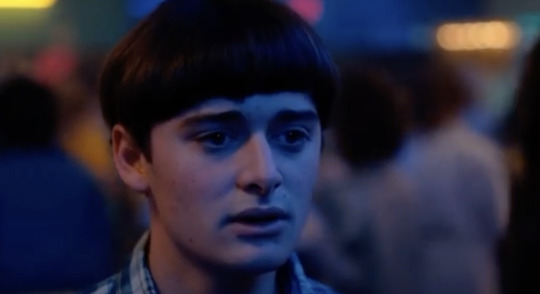
aka arguing with Will about how he sabotaged your day by ignoring you instead of your gf getting bullied x
Will: "Well we used to be best friends!"
Mike: *looks devastated as a song called "In The Closet (at Rink O' Mania)" plays when the camera goes back to him* "Well maybe you should've reached out more, I don't know. Why is this on me? Why am I the bad guy?"
El: *is hiding from Mike in a closet*
Why are you suddenly switching the blame Mike??? Oh girl you're a little too defensive
6. Mike and Will have a heart-to-heart in front of an open closet

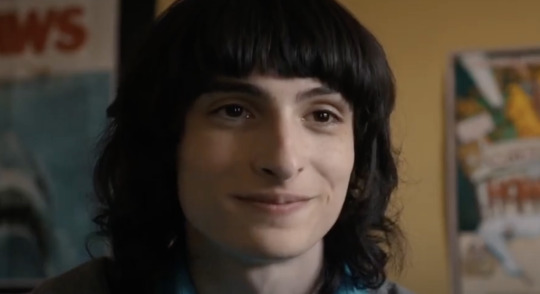
Mike: "No, no you didn't deserve anything... Hawkins isn't the same without you... Maybe I was worrying too much about El... felt like I lost you or something... Friends, 🥺❤️ best friends."
All while Will is tearing up in front of a closet (also the picture here on the left literally has them framed on either side of an open closet WDYMMM)
Anyways,
Byler Endgame
#crazy insane shenanigans#byler#byler endgame#mike wheeler#will byers#byler nation#byler evidence#byler proof
232 notes
·
View notes
Note
You mentioned in a post a while ago an RPG maker game that was so bad it inspired you to start a project that could execute some of its ideas better (iirc), I read the post and immediately recognized the game you were talking about. It's always occupied a weird space in my mind as an oddity of a game that didn't really have any reason to exist, so if you don't mind i'd love to hear more of your thoughts on it.
The project has been on hold (like my 132476 other projects) but yeah!
So first of all I won't be sharing the name of this game because I don't wanna send unnecessary hate its way. Like, making a game and putting it out there is huge, and I'd hate to send a bunch of negativity towards it, and if I find that one of my followers went to it and review-bombed it, then I hold more contempt for that person than the people who made this game.
That said, the crux of the game was you were controlling the main character of the game, but the main character was aware of the fact that you are controlling their actions and as communicating with you about what you need to do. Not a bad concept. I really liked it! The problem came with execution.
There's a lot of specific parts of it that I could point to, but it can really be summed up by the opening. The girl wakes up and does the standard "whoa! what? why did I stand up like this? I-I didn't do that!!" and then a text box appears and responds to her saying "yeah, that was me". Then when you try to leave the hospital, the mc says "wait a minute, maybe we should inspect These Three Spots first!" and then the game turns you around, followed by the text box responding "ugh...fine....".
There are two big problems here in my mind. First of all, this powerful idea of you controlling the main character and the main character being aware creates this sort of connection between the player and the main character (one that I think we'll see more of as Toby releases more of Deltarune, although this game came out a few years earlier), and the issue is that when the game itself gives the player dialogue, that really undercuts it. Like, later in the story, the player dialogue flirts with the mc, which is something I know I wouldn't do as a player. So it's not so much that you're a player controlling the main character who is aware, but you're a player controlling a ghost that is controlling the main character, and the main character is aware of the ghost, but the ghost is not the player.
The second big issue is a lot more understandable because you have to tell a story, but it's very silly to have the main character go "oh my god you have control over my every action!!" and then when you try to leave an area early, the main characters says "no don't do that yet" and then disallows you from leaving the area.
Just to gush about my ideas for this, my project idea was to make all verbal communication be one-way, while finding other ways to communicate. For example, when the main character first wakes up, they realize "oh shit I'm not controlling my body!!" and then he says "alright, well weird ghost controlling me...I don't know what to call you....so tell you what, walk me over to that desk. There's a pen and paper. Use my body to write your name" which determines the name on your file.
But here's the fun part. Let's say you decide "no, I'm not gonna do that". You can just walk out of the room. If you do, the main character just goes "um...okay? Fine then. I'm gonna call you 'Jerkface'" and the name on your file is "Jerkface", and he calls you Jerkface for the rest of the game. (And maybe if you go back, he goes "oh? what's the matter? don't like being called Jerkface? what? does that seem kinda rude? impolite maybe? almost as impolite as just TAKING CONTROL OF MY BODY WITHOUT TELLING ME YOUR NAME FIRST????")
Needless to say, I have a lot of ideas for this, I just need to execute them, and for all my complaints towards this game, I absolutely respect that they made it happen.
82 notes
·
View notes
Text
Why many people dislike Tommy Kinard
Listen, I don't like to try and dictate what characters others can like. However, I do find it concerning how quick so many people are to forgive a bigot who didn't even get a proper redemption. So, especially for those who simply don't really remember Tommy, here's a quick recap of him:
Let's start with Chimney Begins. Tommy is one of the firefighters at the 118 when Chimney becomes part of the team. The first thing Tommy says when Chim arrives is 'Hey Eli, did you forget to tip the delivery guy?' On its own, this isn't really bad, because it could very much just be a harmless joke. But in combination with Tommy's behavior throughout the rest of the episode, one could argue the comment has racist undertones. But this one's up to interpretation so let's move on.
Although not explicitly stated, it's very obvious the 118 captain is racist which is reflected in the way he treats him: he only lets him do annoying chores, is a jerk towards him, actively isolates him, and so on.
The rest of the team, including Tommy, does nothing to try and change this. In fact, they actively take part in isolating him too, for example by letting him sit by himself at a tiny table instead of the group table while they eat. Even when Chimney attempts to talk to them, everyone but Eli (the paramedic who ends up training Chim) blatantly ignores him.
One time, Chim and Tommy are alone in the locker room and Chim says: "Hey man, let's build a bridge here." Tommy doesn't even react. Chim keeps making suggestions of things they could talk about, like movies or sports, to which Tommy still doesn't react except by rolling his eyes. Chim then asks: "You just really don't like me much, do you?" and Tommy responds: "If I thought about you at all, honestly, I probably wouldn't."
Mind you, he doesn't even know Chimney and yet he's pretty sure he wouldn't like him. What exactly is he basing that on? Race, perhaps? (Tommy is very close to some other guys on the team by the way.)
Eli tells Chim that the treatment isn't personal and that the reason everyone is so distant is because in this job, friends die and that the team isn't just gonna give Chim their friendship until they earn his respect. "You don't name a puppy until you know it's gonna pull through."
In my opinion this is absolute bullshit though. You cannot tell me every single probie at the 118 has been treated this way for weeks (maybe months? I don't remember exactly). Also, keeping someone at a distance doesn't mean you have to treat them like literal dirt. It's also worth mentioning that once the captain, Tommy and his best friend leave the 118, no probie seems to ever be treated this way again. So if it's about the nature of the job, why wasn't it like this for everyone? So, despite what Eli said, I think Chim's treatment was definitely caused by racism.
Eventually, Chimney is finally allowed out on calls and risks his life to save Tommy's, which basically makes Tommy go: "Oh hey! Maybe I could treat this guy like a human being?" He thanks him for saving his life and from this point on they're friends. I don't know about you guys, but personally I think someone who doesn't see it fit to treat you like a person until you save their life doesn't seem like a very great guy.
Let's move on to Hen Begins. The 118 is still under the same captain, who is also a misogynist. Unlike the racism, this isn't only implied but confirmed.
I've seen people argue that Tommy can't be blamed for not standing up to his captain because that's his boss. And yet, when the captain says "This is our new diversity hire" about Hen, Chimney says, "You know, Cap, there's another way to say that," which immediately proves that Tommy could stand up to him as well, and simply doesn't have the guts.
They treat Hen similarly to the way they treated Chim. Tommy, along with everyone else but Chim, for example throws some gear on the ground before Hen's feet so she takes care of it, not saying so much as a single word to her in the process.
Chim tries to make conversation with Hen and says "I would've bet money that you were from the east coast, you just kinda have that vibe." Hen laughs and says "Thank you for the compliment?" to which Tommy replies: "New York bitchiness is a compliment?"
He doesn't even know Hen and she's done nothing that could be seen as 'bitchy.' Just some good ol' fashioned misogyny. Chim also recognizes that comment for what it is immediately because he goes "woah, woah, nobody said anything like that, come on." Tommy only huffs in annoyance as a response.
The captain then goes on a rant about how training female firefighters is a waste of money and Chim once again stands up for Hen, unlike everybody else, including Tommy, who just lets the misogyny stand.
It isn't until Hen rescues someone on a call that Tommy and his friend admit they wouldn't have found in time, that they finally treat her like a person. You'd think they'd have learned from Chimney that maybe people shouldn't need to prove themselves to you in order for you to treat them like a human being, but apparently not.
Ultimately, the team submits complaints against the captain and supports Hen but if you ask me, this should've happened a lot sooner and not only after they deemed her worthy.
And that's pretty much all we see of Tommy, except for some short scenes in Bobby Begins Again in which he just interacts with his team until he leaves for a different station at the end of the episode. There's no redemption, no proper apology and, if you ask me, considering the fact that he treated Hen the same as Chim, there's also no development.
And yet there are people who will defend this man with their lives as if 90% of his screentime wasn't him being a bigot or at best a coward without the guts to stand up to his bigoted captain.
So yes, personally I think liking Tommy Kinard is weird.
#anti tommy kinard#evan buckley#911 fox#buddie#9-1-1#abc#henrietta wilson#howard howie chimney han#bobby nash
273 notes
·
View notes
Text
bad svsss fanfic/au idea: random marriage/guidance counselor transmigrates into PIDW, sees the absolute mess of lord luo bingge and his harem, goes "jesus fucking christ", and makes bank.
and like. they're probably not even that good of a counselor. it's just that people lack any sense when it comes to bingge, and since he's the emperor, that means pretty much everyone. also because therapy doesn't exist. i'll give them some credit though, whatever they hell they're doing works.
now, while sqq and sqh are having a grand ol' time in SVSSS with their husbands, this random, average counselor has to deal with being in the care of lord luo bingge. no wife beam. no anything. all they have is some basic empathy and common sense people just tend to lack in here for some reason.
it's even worse considering the fact that they've arrived after luo bingge completed his plan and became the hailed demon emperor. now, while they've never full on read the entire thing, they've heard enough from a close friend who has kept up with it to know the main character is the literal embodiment of the cycle of abuse and heavy unresolved issues. like, it got to the point where they started to unironically use luo bingge as an example of how to not deal with conflicts and trauma.
really, how could people like bingge? seriously, it's just another edge lord main character with way too many glamorized issues and abuse. red flag! (hey, who the hell is peerless cucumber and why does he keep defending binghe? lord, have mercy on these impressionable young men...)
so, after being kidnapped taken in by bingge and his wives after the bunch claimed that they were a "wise man" or whatever (all they did was offer some basic relationship advice to some poor woman, who turned out to be ning yingying, who told the other wives, and it just spiraled from there), they were deemed "special" and given their personal office and a room! hey, better than being on the streets in this god forsaken hentai-ish world, i guess.
quickly, a routine was established. one that, especially, consisted of luo bingge outright ignoring them. which, they weren't complaining about!
wake up, eat, meet with multiple of the wives, spend their hard earned money on delicious delicacies, meet with more wives, sleep, repeat. the most interaction they had with the demon emperor was him ordering them around, but even then, that was uncommon. it was, surprisingly, easy to fall into the rhythm of this undoubtedly odd life. you're upset that lord luo hasn't spent much time with you? maybe you can ask! the other wives are being annoying? remove yourself from the situation. you're upset that lord luo has so many other wives? oohhh... yeah. uhm.
luo binghe only tolerated them, they knew that. and they're sure that, if not for multiple of his wives insisting on keeping them, they'd be dead for even daring to be so "intimate" with them. a little bit of a shock, if they do say so themself. like, insecure much (something that they'll probably never get used to is the fact that bingge built an entire little village for his wives, though)?
but that's not the most shocking thing, oh, no.
it's this.
"i- i tried.. i tried to take the.. hiic-- other.. other shizun w-with me.." lord luo binghe, the powerful, almighty demon emperor, trembles and sobs. "b-but he! he wanted to-- s-stay with that.. stupid, inferior version of my- hic- self.."
despite the mountain of gold they're getting paid in, is it really enough to deal with this? probably not. will they get killed for witnessing luo binghe's vulnerability? perhaps. is he a dictator, the embodiment of the cycle of abuse, and a crazily vengeful bastard? definitely.
"it's-- s' not.." his voice breaks. something else inside of them probably does, too. "..n-not, hiic- fair."
should they feel bad? they shouldn't. he's hurt much too many people. isn't it a little late? can he even be redeemed? because, they are absolutely not here to try and "fix" him.
and yet.
"can you breathe, lord luo? deep breaths, don't focus on anything else but me, okay? i'll do it with you too. can you do that for me? there, there. you're doing a very good job, do you know that? here, when i'm upset, sometimes i like to do something called, '5-4-3-2-1'. i promise it'll help, binghe. would you like for me to do this one with you too?"
they can't help but think about a small, lonely boy on qing jing peak.
. . .
after that, bingbing slowly starts to come around and develop an actual bond! cool!! he just,,, can't believe only his wives were granted the "wisdom". how foolish was he?
"i know i'm only a mere human, but i can tell that lord luo is... masking things. you can put that away for now, okay? i promise, everything you say here will be confidential information, and it'll never leak... no no there's no enemy spies here-"
"i'm not even going to question this. you go back there right now and deal with it yourself if you cannot respect me or the other clients. aka, your wives."
"no, it's not stupid. this is how people help themself, and it's okay if you want to do it. as long as it doesn't hurt you or anybody. it helps, and that's all that matters."
"oh? one of your wife confronted to you about it? i'm glad to hear that, she's doing well, i see. i'm also happy that you're listening too, really."
"yes, and when something like that happens, you--- no- don't pull out xin mo now. what did we say about that? good job."
"here, can i touch your hands, binghe? there we go. when you're unsteady, you feel the need to pick at your skin, correct? well, let's try a few different things to keep those hands busy! it must be quite stressful being an emperor. how about we start with crocheting! it's quite popular back at my hometown."
"your mother sounds like a wonderful woman, lord luo. hey, how about you take a small break and visit her, okay? you want me to come with you? of course, it'd be an honor."
and thus, the story of the poor transmigrator counselor continues on with luo bingge added to their schedule!! this could be read as romantic or platonic lol. but i was thinking of this as luo bingge obtaining his first actual friend. it takes a long while due to bingge's... bingge-ness, but eventually it all works out lmao
#they dont give a shit about if they live or not tbh if lbh is acting wack hes acting wack#intended it to be more crac induced yk but... idk with bingge its a little hard bc i get sad lmao#sorry if it seems rushed this has just been sitting in my drafts for weeks uh oh#svsss ideas#svsss#mxtx svsss#luo bingge#pidw luo binghe#luo binghe#pidw#the scum villain's self saving system#i'm so tired
245 notes
·
View notes
Text
Debated making this, but oh well, here we are…
I rewatched the Loki series.
Going to add here quickly that I have been a fan of Loki since 2012/2013, and I personally relate to his character for a multitude of reasons.
Now, I enjoy the series, but I wish they made it more character focused than they had. I do feel like they prioritised story in terms of making it fit the next phase over exploring and expanding on Loki’s character to some degree (a lot of it was surface level).
For example, I would’ve loved to have seen:
Exploring Loki’s Jotun heritage, even if it was a variant of him in the void that embraced it, dropped his aesir form, a conversation between Loki and his Jotun variant as they explain why they chose to embrace it, giving a different view to maybe how our Loki sees himself/the Jotuns. If ‘What If’ could have a frost giant Loki variant, why couldn’t the show?
Expanding upon what happened to Loki during that year after his fall from the Bifrost. The reason for this is self explanatory really, it would add more lore/depth to his experiences/actions during the Avengers. Maybe address the trauma he has from it.
Loki fighting with his so-called ‘desire’ for a throne more. By this I mean, I felt he flipped pretty quickly from his plan to overthrow the time keepers to just following along with Sylvie - which is fine, but I kinda thought there would be more push back from him. I get it was a life or death situation and Loki’s whole thing is ‘survival’, but it would’ve added to their dynamic and the fact the writers clearly wanted to push how Sylvie was different to other Loki’s.
Exploring Sylvie’s backstory more. It really did feel like it was an afterthought, which is a shame. I suppose they left it ambiguous for certain reasons, but I think they should’ve had more flashback scenes of what Sylvie could remember. I think it would’ve helped people understand and relate to her more. (I do love her though).
Actually showed Loki’s gender fluidity & shapeshifting ability more. Again, self explanatory really & important to his character, plus the whole implied only ‘woman variant’ thing with Sylvie should’ve not been a thing, like at all.
They should’ve given Loki more time to process everything. This show really should’ve had 8 episodes each season, I get that’s not the writers fault, likely Disney/marvel’s doing. Perhaps then the shift in his character wouldn’t have felt so jarring, especially considering he’s 2012 Loki. I do agree they wrote him as if he was Ragnarok!Loki, and that’s not necessarily a bad thing, but it just felt jarring considering the last we saw of this Loki was Avengers. But then I could also argue that maybe he thought ‘what’s the point of it’ because the TVA know everything about him, but I digress.
Used Sylvie more in S2. It did feel like they didn’t quite know what to do with her, her and Loki clearly just needed to sit and discuss the citadel fight, but the closest thing we got is in EP3 where Sylvie says ‘this is all rather familiar, isn’t it?’, referencing their different/opposing opinions on the TVA/He Who Remains. And also maybe the pie room scene, but it’s very vague/not directly addressed.
Explored the fact that Mobius is not a good guy more. Because, he isn’t. And that’s okay. To me, the whole point of the show is based on Loki’s quote of ‘no one good is ever truly good, and no one bad is ever truly bad’, and whilst they do reference Mobius’ own morally grey actions/traits, they don’t particularly make it clear and most just see him as this ‘happy go lucky old man who likes pie and loves Loki variants’. In fact, I actually really liked the scene where Sylvie confronts him - which is a very unpopular opinion to have it seems, lol.
Delved into the psychology of Loki further than surface level/what we already know about him. Yes, we know he’s the God of Mischief. Yes, we know he isn’t evil. Yes, we know he is redeemable. Yes, we know he’s cunning, manipulative and selfish. We get that he projects this ‘illusion’ of himself, but it was only really mentioned in S1 EP1, maybe slightly EP2, before it’s never really mentioned again. I suppose S2 does this to a degree with the bar scene and EP5 of S1 in the time cell with Sif - also I think they tried to take the narcissist angle from the pov that it’s because of his low self-esteem as to why he needs validation and it’s a defence mechanism, but they didn’t particularly make that clear and made it seem like he just thinks highly of himself.
I know it seems like I have a lot of issues with the show, and I do, but I still enjoyed it. It’s okay to be critical of a piece of media and still enjoy it.
I do prefer S2 to S1, mostly because I prefer the direction they took it in and whilst I, of course, wanted better for Loki, I can’t deny S2 EP6 is a stunning finale. I sobbed so hard during the ending and still feel the grief that I actually lost someone I knew personally. But I also have hope that this means Loki is now a main player in the next phase (am I delusional? Maybe).
I enjoyed the dynamics, the back and forth/chemistry, the story was interesting, the set & costume design, the acting, the directing/colour grading, the music (Natalie Holt, you are genius), the emotions, the fun, the characters…
So this is not a hate post by any means, I will once again state, I enjoyed the show. But, I do have issues with it, and that’s okay too.
Please, dni if you’re just going to be argumentative or confrontational. I also don’t want to hear that just because I enjoyed the show that I’m ‘not a real fan’ lmao. I’m sorry, but I’ve been a Loki stan for over a decade, and I will not have someone tell me I’m not a real fan because of a piece of fictional media. Also, please do not mention anything regarding ships on this post, I do not care for it because it always ends up in arguments and I am a multishipper so I don’t tend to fight for any side. Thank you! :) /gen
67 notes
·
View notes
Text
Determinism in TLT
The three people who actively follow my blog will know it, but for the others I'll say it: I don't judge TLT characters personally. (Except if I want to make a point or if I want to provoke a little.) That's not because I think their actions are not bad (they often are). But thing is, I think the characters are hardly made to be judged.
We can, for example, take Ianthe, my blorbo, my wife and my love. It was, all jokes aside, surely a horrible crime to kill her cav. Besides of that, it would maybe really have been better, if she hadn't saved Jod. (I mean, we didn't know it back then, but it seems obvious regarding NtN, even if it's understandable that she doesn't wanted her loved ones to die.) She has a lot of complicated character traits as well.
But if we look at where she is from, it's obvious that she had to be like that to survive. She is manipulative? So is her sister and probably her whole House. She is unnecessary eager to reach her goals (on cost of others)? Surprise, that's what her sister is like and her whole House too!
It's extremly obvious, that all characters are basically caricatures of how their Houses are. Palamedes, the scholar, the Warden... Dulcie, the beauty that blossoms and dies... Oh, even Silas. You would think it was extremly stupid of him to fight Ianthe, but actually, based of all what we know about him, I really think he had no other choice (technically, but not practically) as fighting her for his beliefs. It's so obvious, that even the characters themselves talk about it at a point:

That means: Ianthe is maybe a questionable person, but she wouldn't have been, if she had grown up on the Sixth. Palamedes is a (comperatively) sweet person, but he isn't like that because he naturally is like that, but because he's grown up on the Sixth.
[Let's make a sad little literary class trip:
Palamedes even says himself in TUG, that from (House specific) point of view, Ianthe is not wrong. It's a very interesting moment, because a character of the series admits, that (in TLT) moral is not static, but a question of the point of view. (What's made by the circumstances (in TLT).)


]
And that's what Determinism means. It's the idea, that people don't (only) do things, because of decisions, but because of their circumstances. The idea of Determinism is really important for leftist ideas because it enables ideas like: if you put a bunch of people with no money and boredom in a quarter, crimes will happen. (The idea shifts the attention from decisions to the circumstances.)
Even if the characters of the TLT universe are able to make decisions (maybe), I think it's pretty obvious how much the books are influenced by the idea of Determinism. And therefore, even if some of the characters awake the wish in me to... Oh! What did I want to say? Anyway, I think it's important to regard the context of the characters. It's possible to judge them, but it's also interesting to do it not and look at their reasons. (What doesn't apologize them, but makes them understandable)
This post is involuntary sponsored by this horrorshow interesting post of @swordrogue. I just couldn't get it out of my mind. Please go read it, it's very interesting
#tlt meta#tlt spoilers#palamedes sextus#ianthe tridentarius#harrow nonagesimus#god! I had almost forgotten how interesting TUG is#also it reads almost like a manifest for “recognize the Determinism of that series”#just read it again - half for this post. half because it was fun - and my friendos. I have to go offline for a few days because of Reallife#but I'll become insufferable about it when I come back. believe me
65 notes
·
View notes
Note
Pls tell me about Scott's views on women in general pls I'm begging you
o7 and I'm sorry

~~~~~~~~~~~~~~~~~~~~~~~~~~~~~~~~~~~~~~~~~~~~~~~~~~~~~~~~~~~~~
fyi, the post itself isn't NSFW, but I'll be getting all gender theory in this bitch so I'll be referencing a lot of things and putting in pictures of naked ppl sometimes. maybe skip this one if you don't like that
(long post)
Disclaimers
An explanation for the tweet up there
I usually don't write these because I assume the people on my blog have enough sense to realise when I'm talking about the characters vs the CCs or are comfortable enough being a little confused, but I feel the need to extra-clarify here and expand on how I specifically view C vs CC because I think it differs a little from the average person.
To me, C and CC are two separate entities but not entirely disconnected. What differs (e.g. the exclusion of irl relationships -- their wives, kids, etc.) is poignant enough to severely detach them from the people they originated from, at least in my eyes, but there's also the fact that these are not scripted characters, just creators being themselves with a hint of behind the scenes drama-adding and improv thrown in.
For example, CC Pearl is a car nerd. So I assume her character is too.
This is where I state very clearly that yes, a lot of these thoughts come from things I've seen on Scott's twitter, which is undoubtedly the CC and not the C. However I, to me, am still talking about the C because any observations/judgments I could make on actual irl youtuber CC guy Scott Major would be tabloid at best and slightly invasive at worst. I'm seeing these statements within the context of "the death game guy would say this too and I'm writing this based on that", not "this is the inner psychological workings of the youtuber because I, as a fan, can totally tell".
TLDR I don't consider this post RPF but you might. This is a little more RPF-y than my usual stuff. If you don't rock with it we cool.
Everyone is weird about women, and that's okay
One short-hand I've used in the past to talk about Scott and women is just by saying that he's "weird about women" which I'm sure isn't exclusive to him.
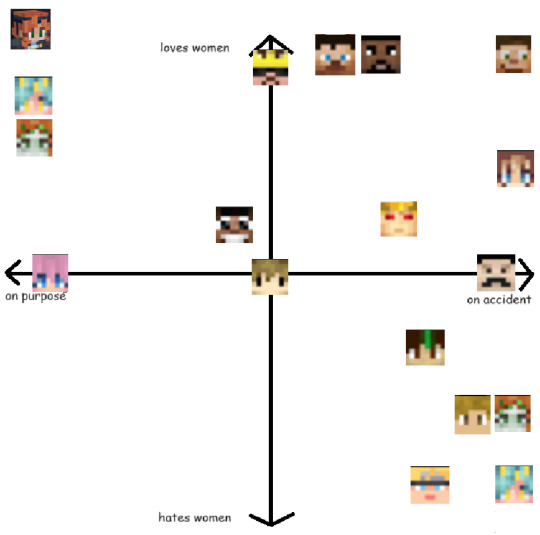
(shitpost I made awhile back)
I see a lot of people now who love "villains" and "evil" but when it comes to any traits resembling real life evil (e.g. misogyny in this case) they suddenly become insecure. Just a couple of days back a saw a post on twitter essentially asking for permission to continue liking CC Scott in spite of the "bad things" he did.
And I think, in order to present an analysis like this, I must address that mindset first.
This is not a judgment on Scott's morality, nor is it trying to dissuade you from liking him. This is not saying that he is any more misogynistic than any other player in the series. This is just me pointing out Scott's attitude towards women and what I read it as, nothing less or more.
The feelings that me pointing these things out - be they apathy, disgust, anger or, what I would hope to see most, interest - are your own. I'm not here to tell anyone how to feel and never will try to police that on my blog.

Scott's Relationships with Women
aka. oh yeah this is about minecraft.

Scott and Cleo || "Yeah, you can kill me."
Scott and Cleo's alliance is arguably the strongest in the entire series, spanning through all five seasons and remaining unbroken with no (serious) drama attached. You'd expect from this that they two have a very settled and stable understanding of eachother, yet this isn't a case.
Their power dynamic shifts dramatically from one season to the next.
3L's initial Widows Alliance began on fairly equal footing, built on the mutual agreement that they were waiting for their respective partners to die. Both understood they were eachothers' "plan B" and felt comfortable in that arrangement.
Come LL, Cleo does what she couldn't in 3L, and initiates that plan, going to Scott after her last alliance, the fairy fort, fell apart. Scott requests nothing from her in return.
DL is the longest the two spent as eachothers main ally. Cleo is the one who initially proposes teaming up to spite their "cheating" soulmates and Scott agrees. Cleo admits to Martyn in private that she's aware she's taking advantage of Scott (which I've always interpreted as her talking about all seasons, not just DL). Due to the time they spend together, it's here where it becomes apparent that their initial assumptions during 3L were not entirely accurate, as Scott shows a level of gameplay competency much higher than Cleo's (e.g. teaching her how to axe-crit) but despite this Scott never berates her or thinks any less of her value as his ally.
LimL is probably this pairing at their most unhinged, as Scott, despite once again asking for nothing (or very little -- I'll be honest I'm a bit fuzzy on this) in return from Cleo, allows them and their allies to butcher him repeatedly for time. He gives more time to the Clockers than he does to Martyn, his closest ally that season. Despite this, Scott is never ever considered as a "family member" by the Clockers, despite them giving that title to even temporary allies (like the Bad Boys being their cousins) -- even Martyn gets a title with Scott completely unattached.
SL is relatively more chill, but shows that the two inevitably end up teaming together even despite their oath to avoid eachother that season.
The point being -- again and again, we see Scott literally and metaphorically making sacrifices for Cleo, with the only real transaction he requires from her being that she continues having his back when times get rough. This is despite that he's aware she isn't any more capable than he is and the fact that so far it has only been Cleo in rough times (LL, LimL and SL) and never Scott.
Speaking from a purely transactional perspective, Scott is not getting a bargain here -- and even Cleo seems acutely aware of it, judging by her comment during DL as well as the way she tends to speak of her survival capabilities very lowly in general ("rubbish pvp skills and spiffy one-liners"). I'm speaking in this sense because I've seen discussions in the past about the transactional way Scott views relationships but rarely does Cleo get brought up.
This is at stark contrast to how he treats Jimmy, whose predicted death was what spurred on Scott and Cleo's alliance in the first place.
Scott assumes Jimmy is "incompetent", where he assumes Cleo is capable. When Jimmy messes up, he reprimands him, when Cleo struggles to crit him, he patiently teaches her. When LL begins, Scott's first instinct was to look at Jimmy's lives and note that he was "useless to (him)", but holds no objections to Cleo joining his alliance despite her already having enemies being a potential liability. In SL, he jokes about how Cleo and him being allied is a given and pretty much expected of them, whereas in LimL he explicitly requests from Jimmy a recognition that he still cares ("say love you back!") before he will help him.

Scott and Gem || "You HAVE TO kill me, Gem,"
In SL, Gem settles in very easily in a leadership position within Gem and the Scotts due to her trying to live up to her reputation but also due to Scott and Impulse's more laid back, passive playstyles.
Both Scott and Impulse let Gem kill them for extra health this season, although Scott is arguably much more subservient than Impulse is, with him not only insisting that she kill him in the final episode but also not fighting back (and only yelling for her to stop) when she starts hitting him with a sword during the episode where her task was to literally kill everyone on the server.
Once again comparing her to Jimmy, Scott in 3L had a tendency to brush aside Jimmy's concerns over alliances (e.g. Jimmy questioning if they could trust Cleo) while in SL Scott runs his plans by Gem (and Pearl and Impulse) in terms of who he wanted to team up with (specifically excluding Joel from the potential mounders alliance) implying he held her opinion in some form of regard.
Before this becomes less of an analysis of Scott's treatment of men vs women and more of Scott's treatment of Jimmy vs everyone else, I think it's notable enough to mention that he and Martyn also lacked this sort of communication in LimL. He would inform Martyn of his plans, but rarely was it ever framed as a request.
SL almost feels as if Scott has slid Gem into the slot he had previously designated for Cleo in 3L (his girlboss ally) as he provides her and pretty much forces onto her by the end the acts of service he'd become accustomed to performing for Cleo.
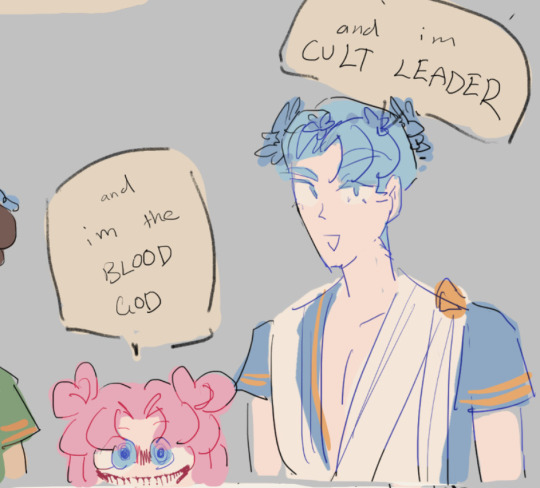
Scott and Lizzie || "You killed her! I don't.. I don't know what to even say!"
Relatively shorter section because this is the one woman he hasn't teamed with, but there's still some interesting stuff I wanted to touch on.
In LL, one of the first thing Scott does is yell at Pearl to revenge-kill Joel for boogey-killing him. Pearl does as she's told and Joel's wet miserable pathetic LL life gets worse from there.
Several episodes later, the roles are reversed -- Lizzie lies to both of them and manages to isolate and boogey-kill Pearl. Scott, instead of reacting with the anger he had for Joel, is almost in a state of shock as he asks Lizzie to let him down so he could collect Pearl's belongings. He doesn't act aggressively towards Lizzie at all, with his most antagonizing act against her being to lie about his intentions when giving her a wither skull.
In SL, he's the only one aware of her early permadeath, but keeps quiet about it almost as if he's in a state of shock akin to when he saw Lizzie kill Pearl in LL. It's not until the others have noticed when he finally brings it up.
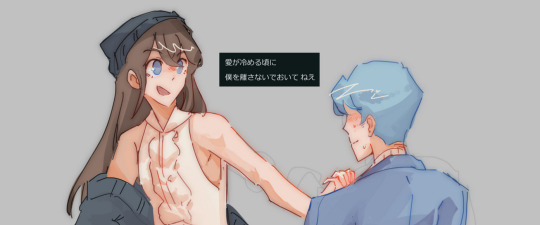
Scott and Pearl || "Tilly death do us 'part"
I wrote a whole post just for their relationship alone so for the sake of my sanity I'll be leaving this here.
So now I get to dedicate this section to the meat of this post -- how the way Scott treats women in general impacts his relationship with Pearl and how I view his heel-turn on her as seeping with relevance to Pearl's perceived gender.
In all three of the previous sections, the running theme is that Scott is 1. kinder and more patient with women, regardless of their competency and 2. someone who likes to be in a supporting role to women, occasionally aiding them more than he aids himself and his closer male allies (e.g. Jimmy and Martyn). As shown with Cleo, he assumes that girls have it together, but even if they don't it's not a big deal. When a girl's actions are truly disastrous, such as with Lizzie's, he goes into a state of shock and doesn't really react, preferring to swallow it down and not acknowledge it.
With the amount of times he sacrifices himself, I don't think it's a reach to say that Scott values his own life less than he values the lives of his (female) allies. This specific point actually does extend to his male allies too, shown when he's happy when Martyn literally backstabs him in LimL, but just as with the Martyn post where I point out his victim status-ing doesn't end at only women but includes all the women, Scott has pedastal-ed all the women he's teamed with.
Lizzie is, once again, the exception here due to his limited interactions with her. However that's actually somewhat patched over if you look at adjacent series (such as x-life) where he definitely shows her a level of admiration and respect.
Back to Scott and Pearl.
Their relationship during LL is very standard of how Scott treats women. While the power dynamic between them is obviously more caused by the initial life trade agreement, I don't think it's a far reach to say that Scott is somewhat comfortable in the arrangement.
However, this is also the first thing that sets their relationship apart from Scott with Cleo or Gem -- Pearl is the one making sacrifices, not Scott. She is the one "sacrificing" her lives to him, just in a more non-violent way as allowed by the season's mechanics.
When viewed through this lens, Scott trying to make it up to her and wanting his effort acknowledged makes even more sense. This is suddenly uncharted waters for him. His assuming that Pearl doesn't value him as a person goes hand in hand with him valuing himself less than her.
What Scott has with Cleo or Gem, situations where the other party is clearly uncomfortable with how he treats himself (Gem) or actively aware they are taking advantage of him (Cleo), is equalized to him because he is inherently worth less. What he has with Pearl, on the other hand, looks more equal to most people (lives vs labour) but is wildly imbalanced to him.
It's one of the many factors I see going into Scott's weird decision to abandon her in DL.
An Interlude, Before We Get to DL
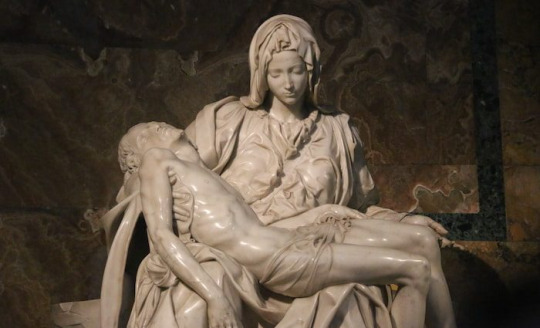
La Pieta, Michelangelo
So this has been a lot of words so far and some of you might be wondering at this point: why say Scott is "weird" about women when so far this has been describing how he values women more, is kinder to them, is more patient with them, etc.? How is any of this behaviour remotely misogynistic?
And I would feel horrible if I forced you to read through all of my DL thoughts before I clarified this -- Scott is not your classic wifebeater "women are lesser" misogynist, Scott is someone who subscribes to misogynistic schools of thought and probably considers himself an ally to women, when in reality his beliefs are still rooted in dehumanizing them and these beliefs end up harming the women around him as well as himself.
After all, seeing women are your superiors is still not seeing them as your equals.
I know it's a bit of a meme on this blog at this point. But. Sigmund Freud identified what we know refer to as the "madonna/whore complex", which he described as a pattern of behaviour in men who separated women into being madonnas (pure, holy and admirable) and whores (debased, sexual, deviant). We'll be focusing on the former, the madonna, as it is more relevant to Scott's character.
Freud proposed that the madonna figure was something men projected onto women as a replacement for maternal love. These women are sacred and untouchable, literally as the projection of the maternal role onto them also makes it so that the sufferer cannot feel any sexual attraction towards her (keep this in mind for later).
Scott projects the madonna figure onto his female compatriots -- they are to be protected, served and supported. They are goddesses, queens, but they are never human. The madonna role in of itself is not inherently harmful to the woman, as seen with Cleo who takes control and advantage of it. However, it is enforced, as seen with Gem who at first revels in the superiority but almost breaks down when Scott offers him up as her sacrificial lamb one last time.
I linked this Utena AMV awhile back when vaguely talking about Scott and women, and this was the point I was alluding to.
youtube
Girls are beautiful and pure. They don't spit on the street, they don't piss on the street, they don't build hierarchies -- they subvert all the expectations of masculinity that I hate having to deal with. They are my escape.
But what about the girls who do spit on the street? The girls who piss on seats? Who build social hierarchies, who size up their competition?
The girls Scott interacts with are all painfully human. Cleo weaponizes his beliefs and take advantage of him. Scott is smart enough to know and accept this. Gem's playing into a role she has been assigned into by not only Scott but everyone around her. Scott supports the character she plays. Lizzie reflects traits he hates in Joel and Jimmy, but for her, he looks the other way.
Are they "demons", as the song says, or are they no longer girls at all?

(demons, gods, but never humans)
Weaponized Femininity and Women In Total Control of Themselves ;)

Hylas and the Nymphs, John William Waterhouse
Historically, weaponized femininity I'd argue is one of the oldest tropes in storytelling. Whether it's nymphs or sirens or witches or succubi or even more roundabout cases like Helen of Troy, there's countless stories of men's sexual attraction to women leading them to disaster.
One way to view these stories is to see them as warnings, don't let womens allure be the end of you.
There's a lot of good writing done on the femme fatale trope both in the context of weaponizing femininity and as a sexist way to argue against victims of sexual assault, as these stories often say that men who experience attraction to these "evil" women no longer have agency over their own actions.
Look at the painting above, for example - is it the nymphs who are responsible for drowning Hylas, or is Hylas climbing into the lake of his own accord?
Despite the fact we all know sirens, nymphs and succubi aren't real, the belief that men will simply lose control of themselves when encountering a particularly alluring woman persists to the modern consciousness. That there's something inherently dangerous about women and attraction to them.
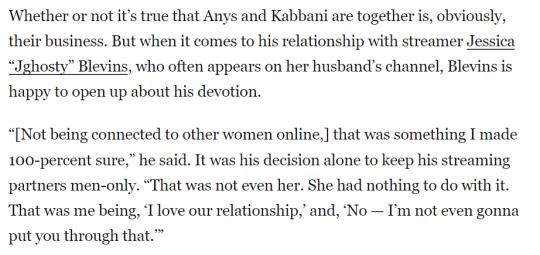
(this is not 100% applicable to Ninja saying he won't stream with women, but it's the real life example I felt most comfortable putting in here)
Now, let's combine this with what's been said so far -- let's say you don't hate women. You love women, in fact, and you hate the way men treat women. You hate men, in fact.
Yet, you still believe in this inherent power women hold by being female and the loss of agency that men experience when attracted to them -- how disgusting.
It quickly becomes easily to not only demonize men for sullying the holiness of women, but also men, masculinity and attraction to women as a whole.
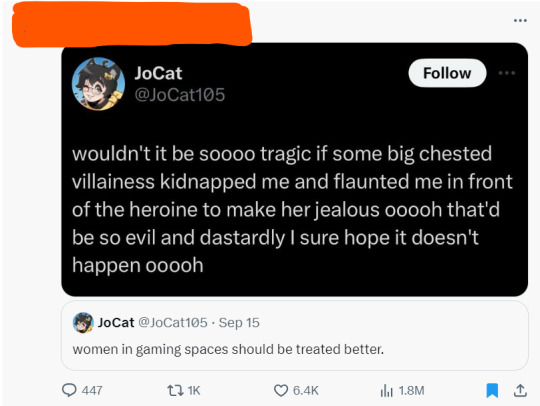
(apologies for using twt discourse in the meta post but this flew by my TL and i had to grab the irl example of mens non-violent attraction to women being used to frame them as misogynistic before the stupid app refreshed and i lose everything forever)
youtube
"To Venner" is a student film exploring a world set within this belief, where all the women have vanished and the men have become monstrous figures as a result of their pent up sexual frustration. fyi this is one of my favourite student films (and ive watched a bunch), but I do think its messaging is worth breaking down (especially its juxtaposition of dirty horrible monstrous sexuality vs pure and beautiful romantic love)
NOTE: this film is super graphic, lots of violence and nudity. have fun. or not
I admit this section is a bit hard to gauge as everyone in the series is gay as fuck. The closest in-series example I can think of is Scott reacting to Martyn's antics in DL with a sort of indigence but otherwise I can't really think of an example of a man expressing attraction to a woman at all, let alone one Scott reacted to. However, I do think it's still worth talking about because it opens up some interesting trains of thought in regard to Scott and Pearl.
For Scott, he himself has never been part of the picture. He's gay, after all, which gives him an edge over the bad straight men who objectify and assault women. Likewise, there's little evidence to suggest he finds the expectations of masculinity frustrating, but I don't think it's too far a reach considering how common of an experience that is for gay men and his adapting of more feminine mannerisms.
Double Life and Corruption

As mentioned in my previously linked post about Scott and Pearl's relationship, I do think Scott experiences what he would name as attraction towards Pearl, so my writing will reflect that.
Pearl is. ahem. not like other girls.
Not actually. But to Scott, she probably isn't like other girls.
She remains unaware of his different standards for her (how could she when she had nothing to compare them to), she acts out, sometimes violently, against Scott's urging (such as when she stole from Scar's wagon). She maintains their already irregular dynamic, and while she appreciates his care for her, she never quite falls into seeing him as a source of subservience the way Cleo or Gem do.
At the end of LL, right before the 1v1v1v1, she monologues to herself that she no longer has to feel bad for killing Scott. Which, in turn, implies she expected Scott to give it his all against her as well.
She entirely fails to embody the madonna with her immature naivete and her questionable morals. She is unpredictable, she doesn't take what she is owed, she is a monster in a lot of ways.
Scott, too, is a monster, to himself, for how he feels about her.
The very foundations of your understanding of yourself being ripped apart aside, let's rewind to the madonna/whore complex. To sexualise the madonna is to corrupt her and make a monster of yourself. Suddenly, you are no better than the men around you, the ones you've grown to hate. Suddenly, you are the grotesque figures in films like To Venner. You are Hylas and she is the nymph. And you are so stupid. Your worldview crumbles around its flawed foundations.
Scott is, however, immune to this corruption. This is a theme that appears in Empires as well, but throughout the traffic series he's prided himself on being loyal and kind and good. His monologue leading up to LL's 1v1v1v1 summarizes it quite well.
He can't let himself or anyone else see this side of him, but the energy needs to go somewhere. To defy fate, abandon your soulmate, is to admit you had a fate in the first place, is to acknowledge that she was your soulmate in the first place.
I've previously talked about how fate and romance are very ingrained in Scott's belief system, if it was anyone else it would've been amazing. He could've been like Bdubs and Impulse or Ren and Bigb, diving into domestic life and performative romance with a stranger. Or the world could've made his happy ending from 3L real, as he got to be Jimmy's husband all over again. I think it says something that he accepts Cleo as a "soulmate" before Pearl.
So what do you do with all that energy and tension, clearly apparent to yourself and everyone else, when you can't let them observe your feelings?
You project them.
Shout-outs to @/legally-allowed-to-slime for pointing out Pearl's comment early on in DL that she "feels like (she's) been broken up with" confirms she never saw Scott in a romantic sense. The "crazy ex-girlfriend" and "this is why I'm gay" comments really did come out of thin air, or perhaps insecurity.
Pearl is the crazy one. She's insane, because she wants me. She wants to be with me, so she does all this crazy stuff. She's lost control of herself because she wants me. She's disgusting.
I mentioned before that Scott is not your classic misogynist, but this is where the gears start turning. Scott's views of Pearl echo that of other players, most prominently Ren and Martyn, that Pearl has been overcome with some sort of corruption. She has become the witch, the demoness, the whore, in their eyes. Scott does not want to be the same as these men and I think his overcorrecting his behaviour in SL makes sense when you view it from this angle, but for now he has to rely on more traditional misogyny in order to navigate this new obstacle.
"Corruption" also implies that she had to have been pure (or at least pure-er) beforehand, something Scott personally knows is not true, but it falls in line with defaulting women to being "madonnas".
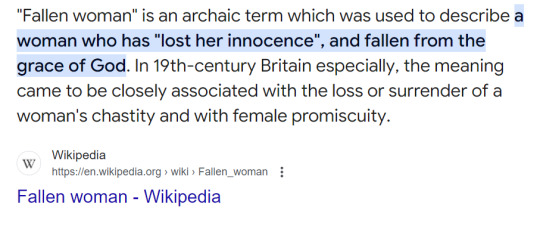
This is a Scott post but. shout outs to Ren for being all of this about Pearl but without the complexity of Scott like he literally accuses Pearl of seducing Bigb what the fuck man.
Pearl is, of course, none of that. But she plays into the role of being the witch much better than she fared playing into the role of the madonna.
Sidenote: I know I'm looking at this from a Scott/Pearl POV but I do feel like you can omit Scott's attraction if you look at it from a purely "pearl not performing to standards of femininity I expect and she makes me realise I don't view women as a whole as human which makes me feel weird so now we have to do this" POV. Like idk I think the exact reason he abandoned Pearl is going to be lost on everyone forever so any analysis I could perform is going to suffer at least a little bit of making-shit-up-itis.
I do also think there's something to be said about Pearl being pushed until she performed a role, any role and generally failing at Being A Girl tm but that's another post i think. yknow shes um. a bit. 🏳️⚧️ (but also very much not at the same time idk that's gonna need its own post)
anyway yeah uh the minecraft movie looks crazy huh
67 notes
·
View notes